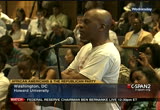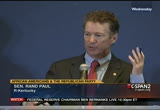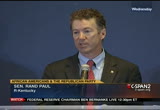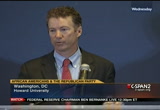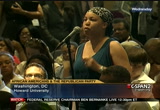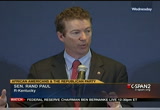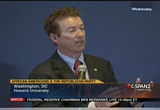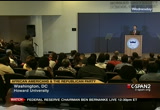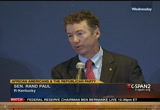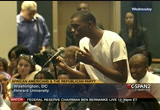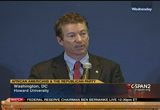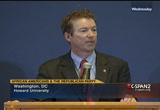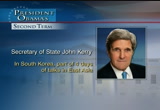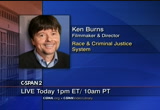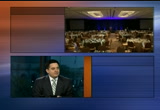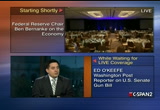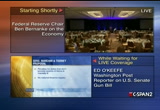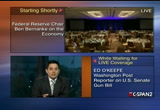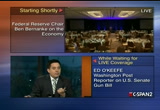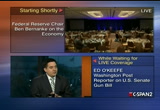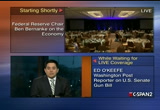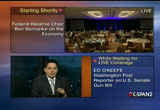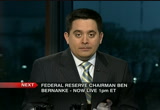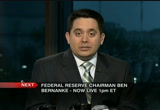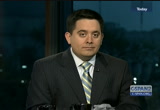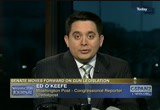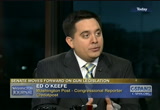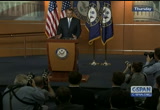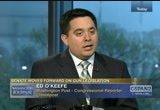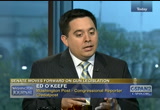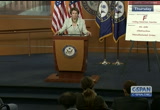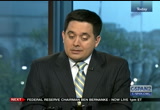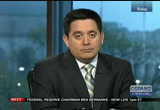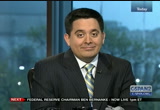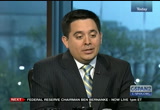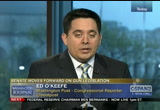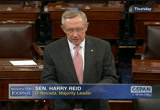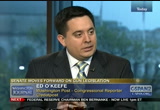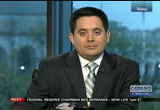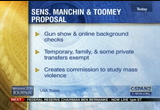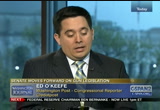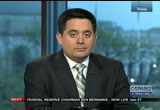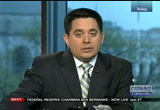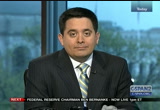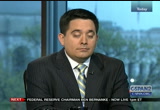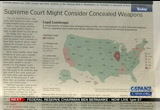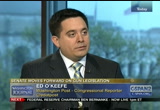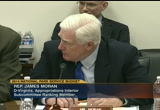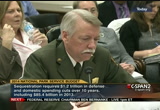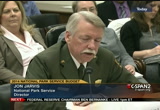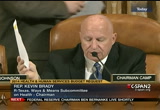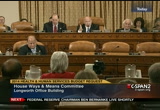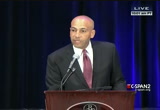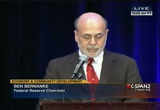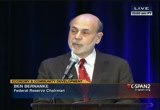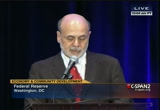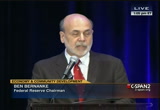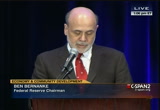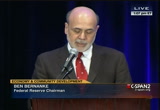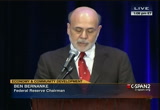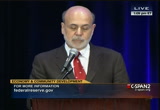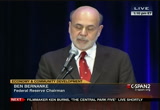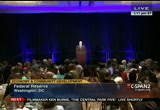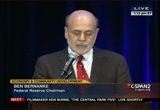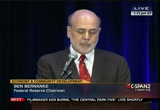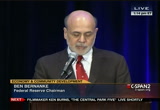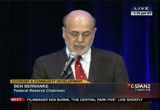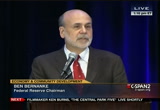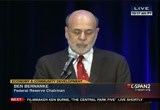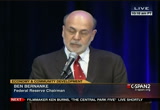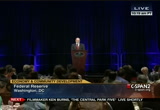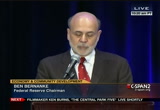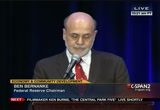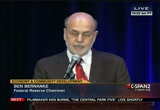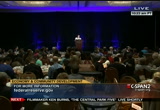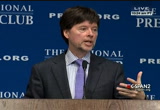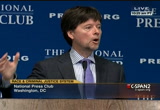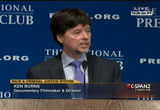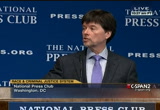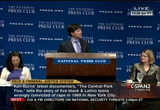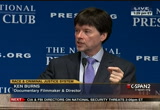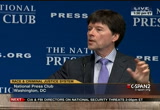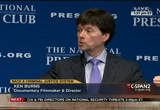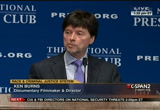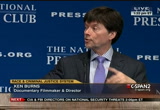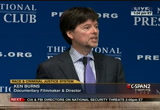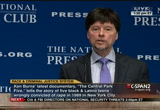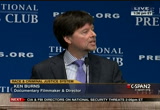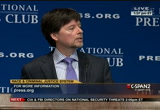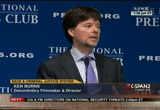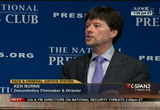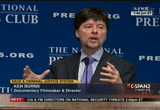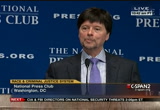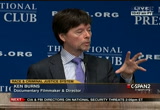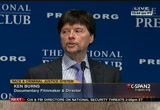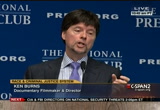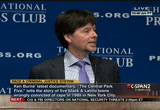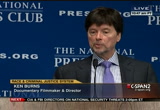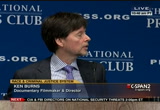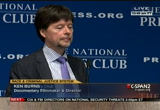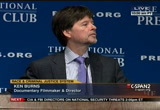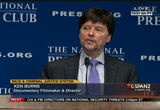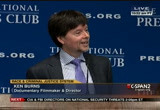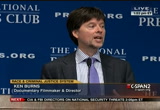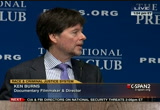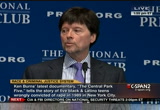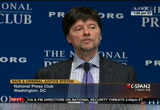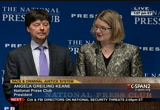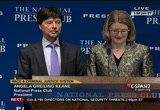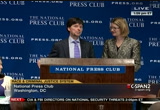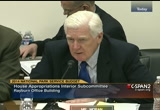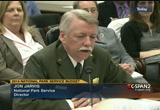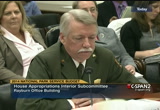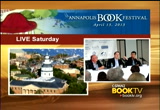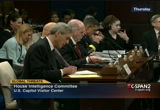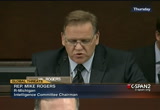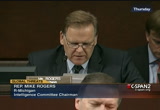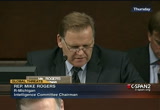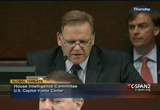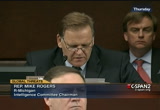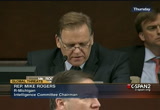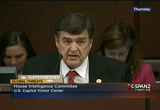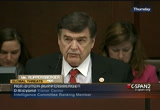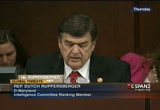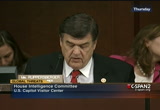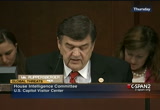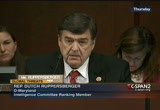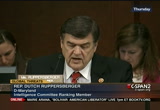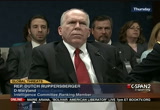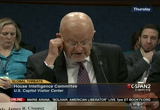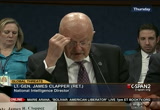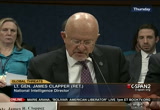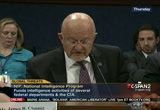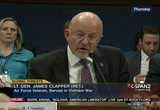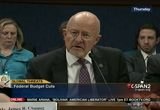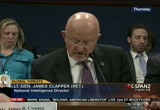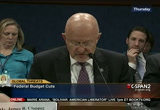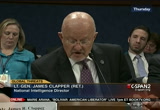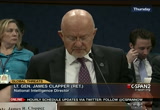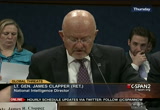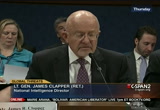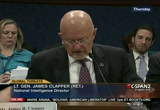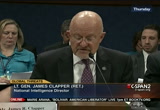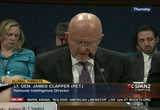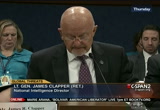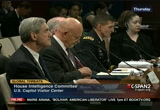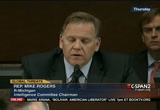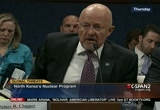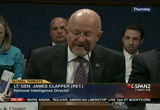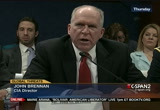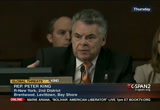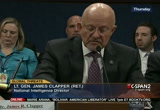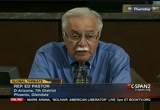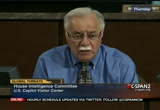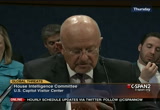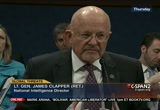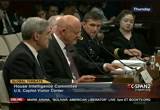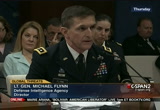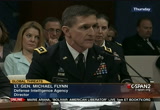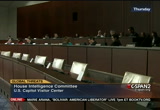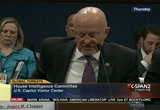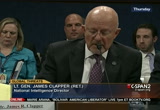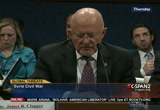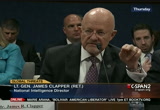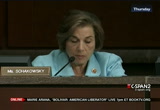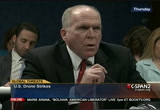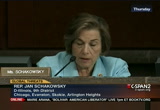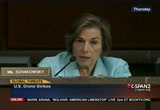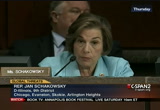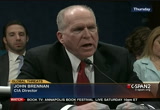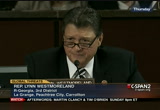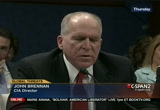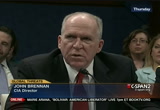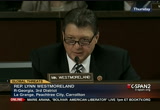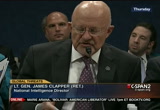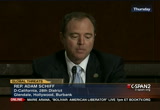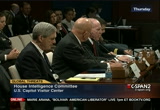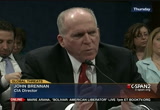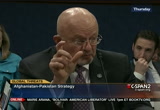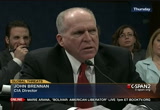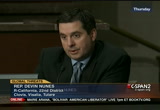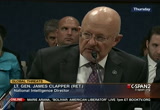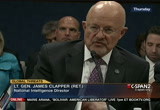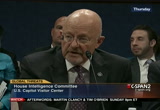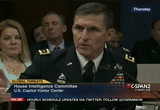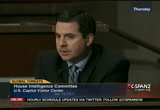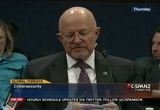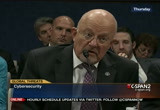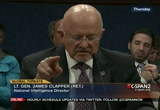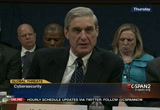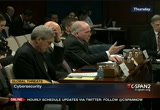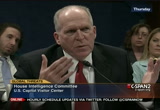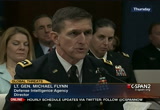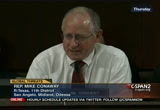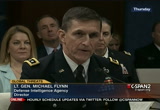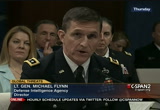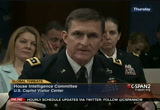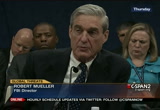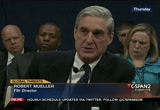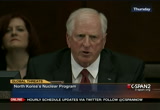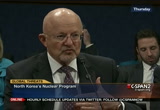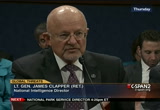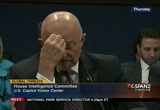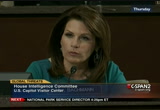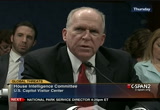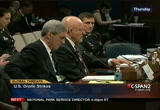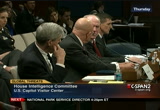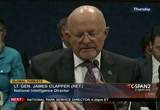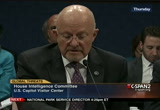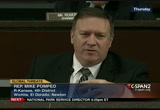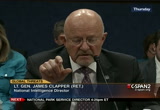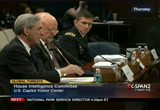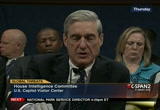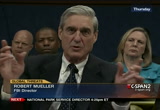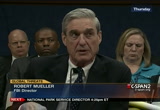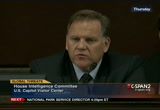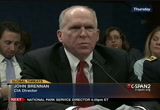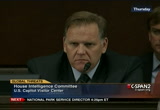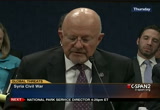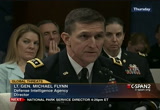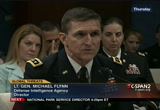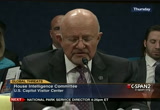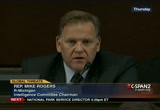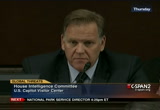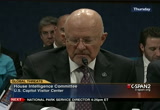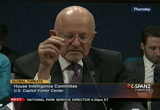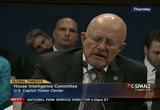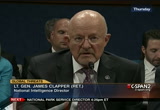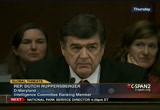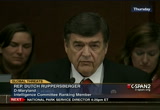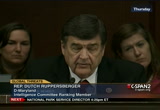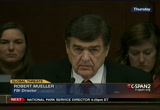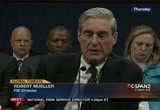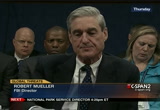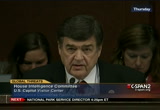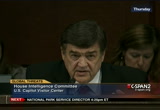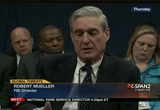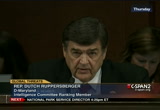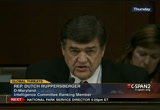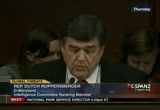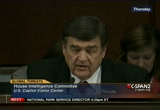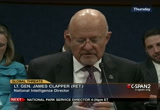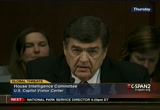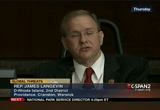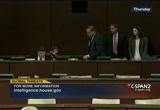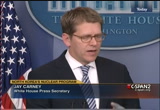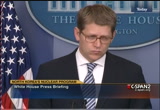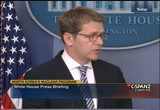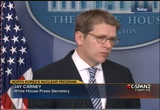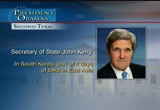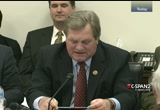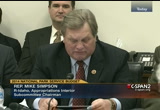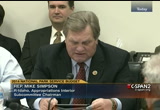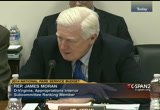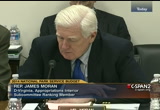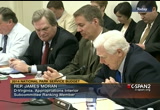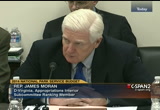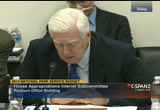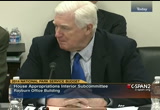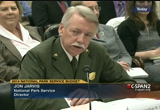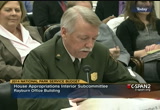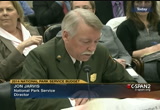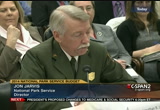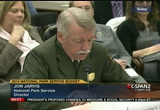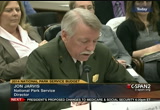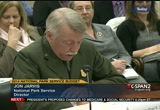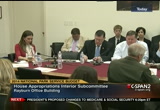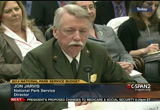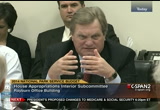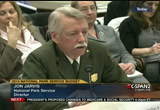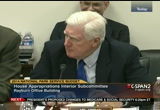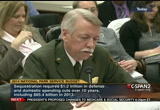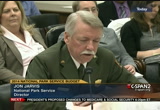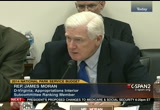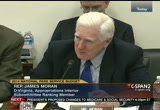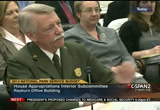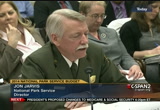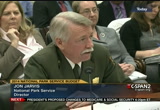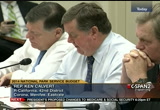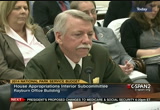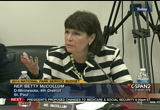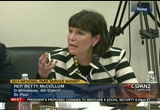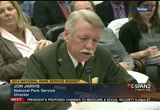tv U.S. Senate CSPAN April 12, 2013 12:00pm-5:00pm EDT
12:00 pm
to declare the war. bill clinton was impeached by the republican house because he allegedly lied about an affair. based on that premise, showed george bush be considered a war criminal for getting the united states into the war with iraq and in the same provision, should barack obama be impeached for getting it to libya without an act of congress? [applause] >> how about yes, no, yes, no. >> they are not the same as people so you don't get a trial by jury and you don't have habeas corpus and necessarily the same due process as an individual gets it and writing sometimes corporations particularly big corporations use the government to get special privileges and live
12:01 pm
against that. i'm against special tax deductions for corporations and i am also against anything that takes your money and professor support its special privilege to corporations. however, on the other side, the corporations do have a very important function in our society. so let's say when you graduate and get out, you start a plumbing business, and you are doing pretty well. you're doing pretty well and then someone sues you. one of your pipes break and it's an accident. make your supply wasn't good, but now all of your profit, all of your assets were taken by the court. should they be also to also get your house in bankruptcy? so bankruptcy is the date of all the time on whether it should go to work its creditors or the debt, and i think there has to be some balance and there has to be some protection because it does help you. you will need people in your life that have been bankrupt three times and then go on to hit it big.
12:02 pm
if we ruin them we don't put people in prison any more but if we ruin them also see it from our perspective and position. i try to do my best all the time, but i'm human. has anyone ever had an infection that i operate on should they be able to come and take my house and things i've worked for for 20 or 30 years? i have a corporation that somewhat secludes me from people coming and taking the house. so i think about that on corporations. it's not all big huge corporations. sometimes it is mom-and-pop or individual parents like your parents might have. on the declaration of the war absolutely i'm opposed to republican or democratic presidents taking us without a declaration. [applause] to more? >> good afternoon, senator. my name is willson, a graduate student here at harvard university and the six department. my question is in reference to
12:03 pm
something you said earlier in your speech, namely that you are for the market's being free. i actually am someone who agrees the market should be free but i wonder to what degree. for example, the idea of there being no longer an epa or usda in order to regulate things that are held for not helpful for citizens to me is a problem. also, the idea that, for example, the monsanto protection act can be sort of talked into various types of legislation or other types of crony capitalism is upsetting to me. so my question is to what degree is the republican party and you in particular dedicated to making sure that free markets are in fact free? [applause] >> i.t. it's a good question. it's also something where i think we have done a poor job.
12:04 pm
i would say republicans have done a poor job promoting that we believe in the protections. and i think that we can do a better job. i for one believe that if you believe in strict property rights and no one should believe that the neighbor's property you should get in junction. you can't take your neighbor's property. the clean water act i think is and has an appropriate purpose or goal. the clean water act says you can't discharge pollutants into the navigable streams of america. what does that mean to me? kunkel company is not allowed and should not be allowed to dump chemicals in the ohio river. absolutely. but you know what it's come to believe over time so i am not opposing having rules. with the clean water act has become is we now say that dirt is a pollutant, and we say that the backyard is a navigable stream. we have just gone too far. this one to the supreme court
12:05 pm
last year brought a 25,000-dollar lot near a lake, not on a lake, no rivers, streams, ponds it is a quarter of an acre. the epa sent them a note and say you are now being fined $75,000 a day and they said why? it's a wetland. going back to the clean water act we took something that was well intentioned to stop the chemical companies from dumping chemicals in the water and we are using it to abuse a middle class family that just put some gravel that never has any water on it. they then have the audacity to tell them you have no recourse in court. so they fought and the supreme court said this is america for goodness sake. the government can't take your property without you getting your day in court. so my answer to you is we need to do a better job that we believe in a clean environment and we do believe in rules, the balance has shifted too far and we are now reducing property rights and ehud using farmers
12:06 pm
and small property owners and we need to shift the balance back to the if you shift the balance of regulation too strongly, you lose jobs, and i think that's where we are now. we have so many regulations that we are losing jobs. >> good morning, senator. i am a former business student here at -- i am from washington, d.c.. how are you, sir? [laughter] >> very good. >> is that the question? >> when i was here in the school of business, i went to one of my teachers office and he said to me you all killed malcolm x. and i was taken back to the estimate say that one more time. >> he said that we killed malcolm x. >> who is we? >> basically in islam -- >> your teacher said we killed. >> here's my point when you open
12:07 pm
the files to who killed malcolm x and what is your position on the request -- [inaudible] >> can i have some patience please. >> let's give him a chance. >> i want to know what your position is on how the request for the separate nation and territory within america. >> my goal is really not separate but equal, but sort of we are always going to be the same someday without trying to be separate and i think we are getting closer to that and so i don't really want to see separation so much. what i would say so is with regard to, you know -- and i can't claim the line and expert on malcolm x to it i know a little bit. i would say that there were some things -- and even from louis farrakhan, there are a lot of things i don't agree with, there are some things that were talking about in torment, taking being a good person, taking it upon yourself to be a good
12:08 pm
citizen in your community that probably malcolm x and louis farrakhan are in favor of that i would agree to. i don't like the idea of separation. i feel we should be moving to words that we are not that different or shouldn't be different at all under the law. >> we will do one more. it's got to be an easy question. >> heineman administration of justice major from rochester new york, a freshman house well. you say you want to provide a government that leaves us alone. quite frankly i don't want that. i want a government that is going to help me, a government that will help me find my college education. i want a government that will define me by my status or my family income. i am a dollar sign with a party in this nation. the society is an image of capitol hill. do you, senator paul to have reformulated solution to come up with new american values so that the citizens of the nation have a worth of more than ben
12:09 pm
franklin? >> i think what i would say when we go back to i want a government that leaves you alone the main reason i say that -- and we can disagree, but probably will end up disagreeing -- what i would say is that the reason i say leaves me alone, the gentleman stood up and got mark on, most are not followers of louis farrakhan but in america you can be a follower of louis farrakhan if you want to. [applause] we don't have to agree on every issue. so, you know, i think there are a lot of issues where we are all the men cannot agree on. but if we have a government that doesn't get involved in every issue, the government that kind of leaves you alone, it doesn't mean no government, doesn't mean government isn't involved in education. for example, one of the things i say it's not that i believe and no government. i believe in a government that spends what comes in, and that is not unreasonable. we bring in $2.6 trillion in money but we are spending
12:10 pm
3.8 trillion. stevan the weidinger education is important and maybe you have a loan from the student government, not from borrowing it from china. i'm figuring out how to get it out of the 2.6 trillion that comes in every year because if we borrow it from china we are going to give you a student loan come to are going to graduate and $60,000 in debt and then you've got no job because we have borrowed so much from china that we are ruining the economy. so it is beyond -- we have to think beyond sometimes the immediate effect i want my student loan, and i am not saying i'm against it. we've to be careful that if we give everybody in the country unlimited student loans and everybody goes to college and then we become the country becomes so indebted that there are no jobs have we done you a service? so it is a balancing act of trying to to give it out. i think leave me alone is a good mantra for the government because the government has to be involved in certain things but there are many things we can leave the government out of.
12:13 pm
12:14 pm
ben bernanke coming to the community of research development conference in washington. we will have coverage of his remarks at 12 thanks 30. right now the senate voted to move forward on gun control legislation and capitol hill for the week they return monday and expect to debate the bill and possible amendments. this morning's washington journal had mr. o'keefe to talk about some of the items on capitol hill. [applause] >> host: thanks for being here. for covering the gun legislation issue what is the significance of thursday's vote? >> guest: the senate is going to talk and that is basically it. at this point in the the date we will begin tuesday afternoon on a series of measures that will
12:15 pm
start with a big one that was announced this week that was struck between senator joe manchin, patrick tooby of west virginia that expand the background check program to just about every commercial sale and exempt most private sales. they said throughout the week that this was something that they needed in order to vote to proceed to a formal debate of the actual legislation, and it is expected that that proposal would have enough. the question then becomes what other amendments would be considered. we believe the controversy will assault weapons ban would be the second amendment proposed said the democrats can hold the vote and move on. there's a proposal from the senator patrick leahy and susan collins to make some changes in the parts regarding the gun trafficking on the practice of buying a weapon for someone that isn't supposed to have one, and from there, who knows. we could see all sorts of different ideas regarding perhaps reciprocity of consumed carry permits across the country. maybe some changes to help the government pays for and supports
12:16 pm
mental health support programs christa country. but we expect weeks of debates at least to the balance at the end of april and first few days of may they don't finish it by then they will come back to it once a day return later in may. >> host: tell us about this first step this amendment by the senator mansion of west virginia and senator pat tooby of west virginia how do they get and put it down and what are the discussions going on? >> guest: i will bring it tuesday. they will have the date on it and they will have an up or down vote. it's believe now that the text is out there that they will have enough support to proceed both as mansion and to me said i am concerned about the entrenchment of the second rights but we have written and what not do that and that is seen as a signal to like-minded senators of both parties to say look there is enough in here that you can support. we have made sure that there is nothing being done that would seize the weapons or make it
12:17 pm
difficult for someone to buy one. there are also pushing the fact that this would make it much more equitable for gun dealers, licensed gun dealers versus people who sell weapons at gun shows because there are certain things they don't have been done shows that must happen at a gunshot and they are saying we're sort of trying to equal the playing field and that is appealing to a few senators to this because majority leader harry reid given any indication of whether there will be a limit on the number of amendments and whether they will take very many from the republican courts? >> guest: that is the big unknown, and there were enough republicans that voted for this on the assumption that he's just about going to allow everything. cost and i think that he understands that not only are the republicans interested in that but there are democrats interested in that because the guns are an issue that breakdown really more over geography than ideology. we have a lot of democrats facing the election next year and in midwestern and western states like mark begich of alaska, mark pryor of arkansas, max baucus of montana, larry
12:18 pm
landrieu, kay hagen of north carolina, the need to be able to show the constituents back home that they are part of a fair and open and exhaustive debate on this issue. so just about every single proposal out there is considered and then in the end depending on what is in the final bill they will cast a vote. i think that he understands enough of the democrats are going to say you have to allow certain votes and some of the most controversial amendments on either side of the to get my vote and he said most of this week. if republicans start to present some amendments that seem poisonous pills or waste or strike down most of law. >> host: part of this process is an amendment would come forward. what do you expect? >> guest: more than 40 votes. he already said it would have
12:19 pm
much more than that. the other controversial proposal that is sought by gun-control groups is one that would limit the size of ammunition magazines and to pass lummis on the size is no york, connecticut, most notably maryland, but a federal ban on the federal restrictions on the size that is likely also going to fail at least those democrats supporting those measures. and the president would want to remember his dramatic turn where he said all of the locals are as a result they will get a vote but they are not expected to pass. >> host: the cnn.com press the victim's people call it sandy hook also been violence and places like chicago going door-to-door talking to members of congress as the speeches are happening. how was it sustained or will it be you said that it could take
12:20 pm
weeks. >> i believe it was no more than eight to ten family members from a new town, a sister of one of them and then a few parents of children who've been most active and local from the start in your here this week to be a given that there are weeks to go and there are so many different instances across the country that has compelled victims and family members to come forward it is likely that we will see rounds of them to come every week to be there are enough groups and enough incidences and people interested that we will likely see them and i expect to get closer to a final passage and we will see a more dramatic showing of them. the families of the newtown victims and their time camp outside of the chambers in connecticut when the state legislature their past their bill i suspect as we move closer to the finish line they will do something similar of here because it was such a dramatic demonstration of the push for this and to put themselves in
12:21 pm
front of lawmakers i think if they can do that to some extent of here they will do it. cementer blumenthal, at her mercy of connecticut have said that the most powerful advocate for this right now are the parents of those children and would be the parents of the 15-year-old that march and the inaugural parade and was killed a week later in chicago but when the parents of the children affected by this come forward and try to talk to the senators, that seems to work. a lot of senators have taken the meeting. i don't want to meet with these people because i knew that it would be very difficult meeting. but i did. and they made their point and some of the meetings have gone very well and others we were told have been more emotional. >> we thought republicans for voting to move forward. some of them did vote to proceed. do we start to see any sort of aural filibuster, any sort of stalling on the floor? >> guest: there have been a threat from the republicans led
12:22 pm
by mike leigh of utah, ted cruce of texas, marco rubio and mitch mcconnell the minority leader. they had threatened to filibuster this but so quickly 16 republicans come forward to say no i'm not going to stand in the way of debating this but they dropped that plan. we also anticipate a class might they might have tried to force 30 hours of debate on proceeding to the actual bill. the crazy procedures that we have. they said no, go ahead, get started on tuesday to meet at some point depending on how the process goes, we suspect they will at some point try to do something. but again, the longer that harry reid allows it to go, the more amendments he permits to have an up or down vote, the more likely they are to hold off. mike especially this week has come forward and said look all we are trying to do is make sure there is a thoughtful consideration and the second amendment rights are not infringed upon. if that happens perhaps they will hold off. jeff flake said yesterday for me
12:23 pm
this was about process and politics. harry reid told me there would be an amendment process and i trust there will be. i am all for proceeding. >> host: and o'keefe "washington post" reporter. in charleston must virginia republican collar. >> caller: thank you for accepting the call. >> host: go ahead. >> caller: the reason i was calling it isn't the guns killing people, it is the cost that's been generated in this country. the same thing with the d why are they going to ban all of the motor vehicles in the country because people get killed with it? >> host: >> guest: they made that point this week it's not just about guns it's about mental health and mass violence. the commission on mass violence was put forth by joe lieberman
12:24 pm
before she retired in january and joe manchin picked it up and got it inserted into this to perform like the super committee did or like the 9/11 commission back in the day they were in the panel about a dozen experts on mental health, guns, school safety. beyond restricting firearms at some point later the congress would then give them an up or down vote. the politics of today is likely they would reject them, but perhaps some lawmakers will pick up specific proposals will push those in the years to come but mansion and to me in particular saxby chambliss made it clear the reason they are willing to have a debate is because they know there will be amendments to address mental health concerns, restricting access to people that are not supposed to have them.
12:25 pm
it compels a lot of people that do this. >> host: north carolina, felix is on the line, go ahead. >> caller: how are you on this beautiful day. it's the best country in the world and i'm glad we are able to talk without getting shot at by the government giving it a couple things i am 100% disabled so please bear with me. the constitutional amendment to restrict the government powers over the people but it's my understanding that only the second amendment as the two words incorporated well regulated and to the actual range which does give the government ability to do something. law-abiding citizens are being infringed by background checks. my question is how do i know that you are a law-abiding citizen, and that brings out number three. the al qaeda spokesman in the top ten fbi most wanted list has a youtube video out that spreads
12:26 pm
of no background checks so they can get weapons to attack america with. and my last one is i've lived in america my whole life, i am here next to fort bragg of carolina, home of special ops. and anywhere in america being a good capitalist society i can get me a firearm either legal or illegal within an hour. comment on those because i haven't heard anybody speaking on those terms. and america you have a good day because it is good to be an american. >> the three things you brought up, i think it was three, re essentially the parameters of what are discussed in the coming weeks as the senators have their way, concerns about the expense and purpose of background checks and concerns about the availability availability and concerns as you pointed out there's been a lot of talk about that this week somehow trying to or have exploited the loopholes and then a broad discussion about mental health concerns.
12:27 pm
they are during those types of concerns and very eager to talk about them. >> host: north carolina jerry, independent collar. go ahead. >> caller: my point is the gun legislation is starting to slip over from being a second amendment entrenchment to be in a fourth amendment infringement because when you start looking to people you start to infringe upon their right to privacy. and that's an area they didn't want to get into also because that is the gun registry that everybody is concerned about myself and a gun owner. we have background checks for any firearm purchases and that takes place at all done shows there is a deputy to the background check and we don't have issues like this. you know, we are law abiding citizens and we follow the law and the rule and we don't have
12:28 pm
the issues the other states have with the mass murders going on. what do you do about the people better out there driving drunk? are you going to ban cars or somebody takes a broomstick and beats them half to death that is an assault weapon at that point. look at what words they are using their. >> host: let's get a response from ed o'keefe. >> guest: there is no discussion about the gun registry that there is discussion about the possibility of what happens when a state reports that somebody is mentally ill and is unable to known or get in touch with a firearm. what happens, for example that registry's public and the insurance companies start reviewing the registry of people that are prohibited and finds out that somebody that they are covering is on the list and then begins charging the family a higher premium? they said that is what i'm interested in hearing about. is there a proposal out there that would shield insurance or
12:29 pm
bar the insurance from looking at this list and find ways to charge people more money? that is an interesting wrinkle in the debate and i suspect there will be some discussion about it. >> host: comments on twitter related to this discussion. c-span junkie says the second amendment is the enforcement of the bill of rights. cars aren't included in the second amendment so registering a gun leads to confiscation. that is his fear that we see a conversation going on about gun shows and what they are like. dennis says every gun show they walk out to the parking lot with no background check, no nothing. one pays cash, one hand is them undone and it is done. >> guest: that is a concern that some of the senators opposed to the plan this week that is pointed out could still happen because what the plan would do is require background checks on any weapon that is sold over the internet or advertised on the internet or the newspaper or placard
12:30 pm
somewhere, but anyone having an e-mail exchange about buying a weapon is exempt from the program. as one senator pointed out he said what would stop someone from going into the gun show, getting a business card, sending an e-mail and saying meet the outside after the gun show closes and i will buy the weapons from you. ..
12:31 pm
they produce a bill, we will review it and, and take it from there. >> you think things have changed the mind set of people up here has changed about guns? >> listen the issue of guns, it has been a issue for the 22 years i've been in congress. and the thing that we have to remember is that laws are only as good as our citizens willingness to obey them. law-abiding citizens do in fact obey them. in addition to that, we've got a system of laws that are not enforced today. now i would think that before we begin to add more rules and regulations on
12:32 pm
law-abiding citizens, that we at least expect our law enforcement personnel and the department of justice to enforce the current law which they are not doing. >> host: house speaker john boehner. ed, what made happen in the house? >> guest: what is happening in the house they're standing across the capitol and waiting to see what is going on in the senate. i had a conversation with a few republicans yesterday who might get involved in this once it comes over there. nobody really wants to move until we get a sense what's real isicly possible coming out of the senate. a lot of members of the hocues from their state senators because many of them used to serve in the house for one thing. they also have a pretty good gain what their state might be amenable to moving forward with. the fact that pat toomey got involved this week is notable because he hadn't been a player beforehand. what is also important because he is close to most
12:33 pm
pennsylvania i can't's 13 republican congressman and having been one previously. we've been talking to him throughout this whole process. we like his plan. we think it is something that actually could work over here in the house. that was a critical piece because it potentially bought this process some time and political capital in the republican-controlled house. there are three, four dozen republican congressman who represent suburban districts around places like chicago, philadelphia, cincinnati, cleveland, new york city, miami, that if they don't engage in some kind of a debate, you could see them face some real problems next year. my colleagues paul cain and phillip rut ger looked at this yesterday for today's paper. i think, yeah, there you are. and it is a fantastic look ahead because what you're potentially seeing now is pressure put on these suburban house republicans who the democratic
12:34 pm
congressional campaign committee plans to target. they may tell speaker boehner and house judiciary committee, we need to debate this. if we don't have this around the house, my political life is on the line and the balance of power in the house potentially as well. >> host: following up on what speaker boehner had to say. if they don't enforce laws like fast and furious what chance they will abide by their own gun law once passed? minority leader nancy pelosi was asked yesterday during her conference about those comments speaker boehner made regarding law enforcement and lack thereof. let's her response. >> it sad ends me because obviously we should enforce the laws we have, there is no question about that. many of us said that over and over again. the most recent supreme court decision on guns recognizes that there is a role to be to regulate, if that is the word, guns.
12:35 pm
the heller decision relating to the district of columbia. but, that is not enough. that is not enough. i don't know how it can show our faces to these families or even look ourselves in the mirror if we don't take something more serious. as i have said to you over and over, any one of us as members of the congress, democratic, republican, anybody, would stand in front of an assault on our children, to protect them, protect them from any attack, we should have the political courage to stand out there and to protect them from gun violence as well. >> host: minority leader pelosi in the house. ed o'keefe, questions being raised over enforcement of existing laws. >> guest: that is a big element of this debate. the justice department certainly has several different federal gun laws on the books. republicans and democrats both point out enforcement of them hasn't necessarily been as could be.
12:36 pm
i think the justice department would turn around and say, if you gave us more money and manpower we would be able to do a better job, we'll see whether or not that happens throughout this process. there has been a lot of talk about changing gun laws. i haven't seen any real significant proposal to give the justice department hiring ability or money to work on this while dealing with everything else they deal with. one piece of the senate plan would give $40 until to a justice department program to help school districts revamp their school security programs but doesn't say about enforcing laws or making sure did. oj has more money in place. i suspect, especially in the house once debate really begins over there they will drag in a few justice department officials to explain how well they have been prosecuting gun laws on the books and, you know, why it is that perhaps they haven't been doing as much as they could. >> host: go to california, hear from aaron from ventura, republican. hi, aaron. >> caller: how are you doing? >> host: good. >> caller: thanks for your show. i wish you could move it a
12:37 pm
little closer to prime time so we --. >> guest: you're up early. >> caller: yeah. i just wanted to, to ask on this whole gun control issue, i don't understand the lonic. i mean, you've got chicago and new york are perfect examples of any kind of gun control. so, where is the logic of any of these arguments at that they're bringing up? i mean, i think just another diversion that's created from, from a, media-fueled, knee-jerk reaction to violence, close at home. and just diverts the public's attention away from, from a bunch of other important issues that have a huge potential for violence right here in this country and other countries like afghanistan, north korea, or
12:38 pm
the issue of our economy, or all the deals that we've got going with communist china. you know after 68,000 people get killed in vietnam and, we're in bed with countries like that, those are pretty big issues i think. >> host: a ron, let's get a response from ed o'keefe. >> guest: others made that point about urban gun violence and whether or not the laws are being properly enforced in the states especially since those states already have pretty strict gun laws. the. >> host: marion in louisiana. robert is a democrat. welcome, robert. >> caller: how y'all doing. i've been looking to this gun control thing, this is driving me up the wall. our president should do, talking about arizona, running guns. just, open up and sell guns to everybody. just sell guns, go back to the western days and let everybody tote guns. i guaranty you, we'll have
12:39 pm
fun control in this country because when people start bump up against each other because somebody stepped on their foot, start killing each other, this gun control thing will come to an end. all we have to do let guns be legal all across the land, just like drugs. let drugs be legal too. we'll have a western-style society and i guaranty you, the people that run around with these ar-15s, they will hurry up say, foul, foul. dig up all guns. everybody has guns. take them off the streets and that would end this whole conversation. all you have to do is let everybody have guns across the board. >> host: are there any talks about loosening gun laws right now? >> guest: well, a lot of states have done a few different things to make it easier to carry weapons in certain places. the one that sticks outs specially in arkansas. they passed a law, if a church permits it, can carry
12:40 pm
weapons in a church. made similar law for college campuses. similar proposals are in different states. shielded lists with people with concealed carry permits and ability to carry them in states like maine. south dakota passed a program to permit eligible people to carry a weapon onto a school campus if they have undergone a training program so that they can provide protection if necessary. that would allow basically teachers and guidance counselors and janitors to do that if they so choose. there have been something like 1500 different pieces of legislation proposed. i think basically in the wake of newtown. all across the states. most of them, most notably, would try to restrict gun rights. there have been several states. mississippi is another one i can think of. wyoming as well made it easier to carry places in certain places and clarifying where you can. to also restrict access to lists of people who do have them. that was partly in response
12:41 pm
to a newspaper outside of new york city that published a list of people who had conceal carry permits. were a lot of concern about privacy in that state so some of the states responded. >> host: forget the politics of this paul writes in and asks, will the in. ra targeting manchin and toomey over their compromise. bell shares his opinion, manchin is toast in west virginia. going after guns not fighting for coal miners, losing their jobs? boy. >> i asked him about that concerns with the nra. look, i've known these guys for a very long time. we worked together on host of issues when i was governor. now i'm in the senate. they know where i am. i know where they are. they have involved in the process all along. both of them say this is probably their best chance to get some things changed that they have been seeking for years, especially someone from pennsylvania is trying to travel to canada and has to go through new york and they have a weapon with them in their car.
12:42 pm
this clarifieses sort of the ability to do that without poe essentially getting wrapped up in some legal situation with authorities in new york. the ability of basically to transport weapons or to allow a gun owner or gun shop owner to travel across state lines to another gun show in another state. these are the types of things the nra pushed for years. manchin's statement to me was the best they could probably get in the current situation. there are a lot of things in there they would like. they should publish the manchin-toomey proposal in the nra magazine and let members read it and i suspect if they read it they will like a lot what is there. >> host: listen to what senate majority leader harry reid after the vote. he gave credit to a republican for helping move things along. >> there have been many things written in the last several months about how the senate can not operate. and i so appreciate the members on the other side of the aisle, especially john
12:43 pm
mccape, on a sunday show, said, i don't think there should be a filibuster on this. john mccain is leader of, has opinion a leader in it country for 31 years. people respect his opinion. and i am grateful, to all republican who is joined with us to allow this debate to go forward. now, the hard work starts now. >> host: majority leader harry reid. here is an article in the "wall street journal." a bipartisan breeze begins to waft through congress. ed, what is going on? >> guest: only a week in the history of the congress. we'll see. having talked to a lot of different senators about this, they say look, if this is how things are going to work, if they're going to be thoughtful, extensive debates on different issues, then we're all for it. and if this continues on, immigration, on budgetary concerns, then, i have no reason not to vote for it, at least a formal debate on
12:44 pm
the issues. that is what the senate is supposed to be. that is what they say. i'm here to debate the big issues of the day and eventually vote on something after it has been debated. and, you know, that is something that hasn't happened in recent years, on this issue especially because it cuts across geography rather than ideology. harry reid understands he has to do this. he stepped up and allowed for this. john mccain made the statements and roped together 16 republicans who were willing to proceed to debate. shocking to think that the fact that the senate is following the rules is news. >> host: ed o'keefe, is congressional reporter for "the washington post." he used to write the two chambers blog. you may have read that on "the washington post" website. he is righting for the fix. they have combined efforts. joined forces of the has a variety of experiences working for "washington post" and writing about the federal government, in the federal eye, covering the 2008 presidential campaign. he is producer and fill-in anchor at one point for
12:45 pm
washington post radio. overnight homepage editor at washingtonpost.com. you have had all the experiences from beginning to end in "the washington post" at this point. >> guest: that's right. >> host: now covering congress. let's go to richard in carlsbad, california, on our independent line. >> caller: good morning. i don't own did guns. i don't really care about gun laws but seems like the media is, although television news stories, seems to set off these people in waves and, --. >> host: who do you mean by these people, richard? >> caller: disturbed people looking for attention. >> host: who commit the crimes? >> caller: yeah. >> host: okay. >> caller: and so, if we need an editor-in-chief, you know, i could volunteer for that, and, because, the first amendment, really doesn't apif people are dying. of course i would give a waiverer to ed and libby.
12:46 pm
you guys are great. >> guest: well, you got up early to watch us, so i exposure too. you know, look, people have made that point and, we'll see if there is any discussion of how the first amendment bumps up against the second amendment and causes some of this violence. i think the fact that there is discussion of a mass commission on, commission on mass violence, is sort of a way of opening the door to a discussion about that side of this. >> host: we see that in the manchin-toomey proposal, creating a commission to study mass violence. ed o'keefe, what is knew about this? what are senators offering that hasn't been already discussed or looked at. >> guest: in the case of the commission? >> host: yeah. >> guest: they're using a tried and blue format in washington establishing a blue ribbon panel of experts. the way they see this, sold it to each other, if we remove ourselves from the process, find a bunch people who can go sit in a room and hash out the different theories, a lot of which
12:47 pm
people this morning have been talking about, and then they come back to us, with, you know, a unanimous set of recommendations, that have sort of surveyed the country and surveyed the industries that are of affected by all, why wouldn't we, at least look at the possibility of taking those recommendations and turning them into legislation. what it essentially does is buy the issue a little more time. once the house and senate acted on the first bill, this might compel congress to in year or two, after the 2014 elections and continue discussing the issue. many people have said the fact that newtown, the shooting in newtown happened and schoolchildren were targeted, now, makes this an issue that can be discussed more openly and for years to come to insure that such a thing doesn't happen again. it is designed to buy congress some time and allow a group of people to discuss other possibilities outside the realm of congress. >> host: john in alabama, republican. hi, john.
12:48 pm
>> caller: how are you doing this morning? >> host: good. how are you? >> caller: there are two things i would like to say. first that the connecticut shooter murdered his mother. he stole the guns. he stole her car. and then drove to a school and murdered 26 other people. there is not a law that they're talking about would that stopped him or jared loughner and john holmes or james holmes because none were adjudicated mentally defective. secondly on background checks, it is ludicrous to think somebody will break into a house, steal guns, take them and trade them for drugs or whatever else, and then a background check will be done on the ill list it trade of those weapons? >> host: john, we see a comment on facebook from curt. says none of this really has
12:49 pm
anything to do with gun control or keeping anyone safe. it is about the expansion much federal power and scope. another person who shared thoughts similar to yours was the leader of the republicans in senate, minority leader mitch mcconnell. let's take a listen what he had to say before the vote. >> i believe the government should focus on keeping firearms out of hands of criminals and those with mental issues that could cause them to be a threat to our society. the government should not punish or harass law-abiding citizens and in the exercise of their second amendment rights. unfortunately s-649 has the focus entirely backwards. >> host: ed o'keefe. >> guest: he is at least a member of 14 senate republicans saying they would have blocked debate on this. we'll see if they hold together or try to block it or delay or prolong the debate at some other point. mcconnell basically sums it up there. the focus on guns as opposed
12:50 pm
to mental health. as opposed why it is that people decide to act out ising that they don't think is necessarily covered in this bill. supporters turn around and say we're about to have a conversation that might permits bits of that to get into it. >> host: let's hear from gill, jamestown, north carolina, democrat. welcome. >> caller: good morning, libby, welcome to your guest. quickly, a lot of debate about the whole gun issue. i heard a lot on c-span regarding gun owners and their fear that right to bear arms and the second amendment will be ainabouted in any way. of course it says a well-regulated militia being necessary to the security of a free state, the right of the people to bear arms. if you look at the constitution, libby, and your guest, what am i missing and reading the constitution in section 8, article 1. permit me just two sentences. to provide calling for the militia to execute the laws of the union, suppress insurrections and repel invasions.
12:51 pm
here i stop parenthetically the founding fathers were slave owners. what insurrections were they worried about? they were worried about slave insurrections. we have no more slavery in this country. in terms of invasions, we have an army and, if you want to look at the drug wars, look at those invasions to protect us from the influx of drugs coming into our country. the second to last sentence, to provide for organizing army and disciplining the militia. and for governing such part of them as may be employed in the service of the united states. reserving to states respectively the employment of officers and authority of training of the militia according to the discipline prescribed by congress. i pray that the supreme court would ajudicate the constitution as it is read. we would read the constitution and our lawmakers would follow and legislate according to the great document of our country. >> host: let's take a look at the second amendment.
12:52 pm
get a response from ed o'keefe. >> guest: i just like the fact that people have copies of the constitution and read them so closely. look, all of the callers this morning have encapsulated where the debate could potentially head. i can assure you your lawmakers are hearing from you and hear you and understand what you're trying to say and i think there is real eagerness to discuss this big-time up in the senate which is why you will see the senate has spent the balance of april discussing it and maybe may. >> host: we see a see a story in the "wall street journal" the supreme court might consider concealed weapons. the occurred ruled americans have a right to keep loaded guns at home. now may decide whether and to what extent there is the right to take them out and about. on friday the court is expected to consider whether to hear an appeal from a handful of new york residents whose applications for licenses to carry concealed weapons in public were turned down. >> guest: that could become an issue in the debate because there is talk of
12:53 pm
allowing one's state issued conceal carry permit to apply everywhere else. certainly that will be a big factor i suspect in this debate. >> host: let's hear from jacob in illinois, independent caller. hi, jacob. jacob, are you with us? last chance for jacob. >> guest: doesn't sound like it. >> host: okay. we'll move on from there. ed o'keefe, what are you going to be watching in terms of signs of how and ultimately things may shape up? you taken us through the timeline of things. what will you be looking for next week and week after as early indicators. >> guest: i think which amendments get proposed and which ones rise to the top and which ones are harry reid and democrats willing to allow to be voted on and do they try to pull any procedural maneuvers that make it more difficult for certain ones to pass. if that starts it happen, potentially will poison the well and make it more difficult. supporters of moving forward run a real risk of seeing
12:54 pm
certain proposals put forth that would water undo the bill. the president himself made it very clear in talking about the manchin toomey agreement this week, what they proposed not what he wanted but he at least appreciated the fact that congress is working together in bipartisan fashion. we'll see. the fact they got through this week, when everyone seems to relatively pleased, that is one week down. there are two more weeks before recess. we'll see how things are at that point. >> host: ed o'keefe, you can read his stories in "the washington post" and at washingtonpost.com, one of his recent stories is about this maneuvering in the senate, what is happening next at ed o'keefe is writing extensively about gun legislation as well as other congressional issues. thank you very much for joining us. >> guest: thank you for -- >> quick reminder we'll be live shortly with remarks from fed chair ben bernanke. he is expecting to talk about the condition of the u.s. economy and the role of community development. mr. bernanke will be speaking here at the bian all community research
12:55 pm
conference in 1230 eastern. it was expected to start and running late. the tile set for start is 1:00 p.m. eastern. we'll have live coverage on c-span3. very quickly some news. tennessee dim catt steve cohen is make taking heat over comment about singer cyndi lauper. he is scheduling a news conference to talk about that we're ever coulding that weill we wait for fed chair ben bernanke we'll show you testimony this morning on the 2014 budget for the national park service. john jarvis was questioned by the house appropriations subcommittee on the interior. >> you know the senate, when they had to find an extra $20 million in the cr, they took it out of park services operations just because it was the easiest thing to do. so i'm glad the chairman raised that. $111 backlog and we are only able to put, what's the percentage, i will leave it
12:56 pm
to the them to figure out the percentage but it is miniscule. let me ask some other things. the sequester, an clued discusses to the park police budget. there, as a result of those cuts, there is going to be a furloughing of park police officers over the next six months. this is going to be a tough time to be furloughing park police. so, i would like to know how you're dealing with it, and still insure the safety and security of our park visitors? >> yes, sir. so, with the sequestration, suns it was applied line by line in the national park service as he is budget, each of our operating accounts, took a 5% cut. so, the u.s. park police is approximately $100 million operation annually. it is a. it is a program that is essentially all salary and operations, helicopter fleet
12:57 pm
vehicles and emergency response. so we had to take a $5 million hit halfway through the year, indicating of course the park police have been operating, we had a major role in the inauguration, a number of events. u.s. park police, for those aren't familiar, they are the elite urban law enforcement organization. they operate in washington desee, san francisco, new york. they protect the statue of liberty, the golden gate bridge, the presidio, the washington monument and memorials, the gw parkway. we're working closely with park police. the current expectation well have to defurlough every employee in the park police, every 14 days each. literally a full pay period. and, we're looking to see how we can balance the, our responsibilities for icon security and, and emergency response, across the u.s.
12:58 pm
park police responsibilities. and, we're looking at every major event that we have scheduled for the rest of the year. there is the 4th of july and rolling thunder and, you know, the cherry blossom festival. all of those require extraordinary responsibilities upon our part. so we're analyzing that at this point. we have not found a solution that will not require furloughs. >> so everyone of the more than 700 park police will be furloughed for an entire pay period. >> that's correct. >> over the next six months. >> we're waiting for fed chair ben bernanke to discuss the latest economic news. ahead of his appearance the associated press has this story. fed chair ben bernanke says, housing remains depressed in many low-income neighborhoods even though the overall home market is making gains. he is urging a broad approach to the problem that seeks to improve education and jobs for lower income americans in addition to housing. part of his remarks that we expect to hear when fed chair ben bernanke shows up
12:59 pm
in just a couple minutes. we'll have live coverage on c-span2. while we wait, questioning this morning of hhs secretary kathleen sebelius before the house ways means health care subcommittee on the budget for hhs for 2014. >> online, this is the marketplace timeline for the exchanges. and that's for the public as well as lawmakers to track how the exchanges are on track. but, as i look at it, what i see is deadline after deadline missed. it says, if the agency is in disarray, trying to meet the october 1st deadline. the final market rules and regulations, was missed. the payment notice rule was missed. the business rules for information technology, that is two months delayed. you recently announced delaying a choice option for small businesses. you delayed the basic health care plan for year 5 of it.
1:00 pm
so these delays have real impact. real people are concerned about these delays and the failure by the agency to meet these deadlines raises real concerns. so my question is, do you have a plan b? do you have a contingency if the exchanges are not ready, up and running with fully-informed public by october 1st? . .
1:01 pm
no further delays in the implementation of exchanges? >> we are on track -- >> we leave these remarks at this point. you can see all of our coverage of the hearings this week in the c-span video library. go to c-span.org. highlight to remarks from the federal chairman ben bernanke expected to discuss conditions of the u.s. economy. >> dr. bernanke also serves as chairman of the federal open market committee, the system's principal monetary policy-making body. he originally took office as the chairman of the be reversed, 2006 when he also began a 14 year term as a member of the board. and before his appointment as the chairman, dr. bernanke was the chairman of the president's council of economic advisers. chairman bernanke has had a keen interest and many community development issues raised at this conference. he has encouraged us and others
1:02 pm
in the community development field to consider a new way to undertake research and to utilize data as we approach -- as we look at approach is to do our work. he's also encouraged us to look at what works and what doesn't and white. please join me in thanking chairman ben bernanke. [applause] >> i'm very happy to be here and joined the evan bayh annual federal reserve system community affairs research conference. the work you are doing here, sharing research and exchanging ideas on how best to further the development of low-income communities is vitally important. as this year's theme resilience and rebuilding reflects low-income communities particularly hard hit by the
1:03 pm
great recession. while employment and housing shows signs of improving for the nation as a whole, conditions and lower-income neighborhoods remained difficult by many measures. for the disabled and analysis by federal reserve staff reveals long vacant housing units tend to be concentrated in a small number of neighborhoods that also tend to have higher on a plan of rates, low educational levels and median incomes. while some of these neighborhoods are in inner cities, some are in suburbs. this analysis and others like it illustrate the close interconnections of housing conditions, educational levels and unemployment experience within the neighborhoods. moreover, as this confirms, poverty is no longer primarily an urban phenomenon that has increasingly spread to suburban areas many of which lack the social and community development sources needed to mitigate poverty and its affect. the implications of the trend is
1:04 pm
for community development or profound to be successful strategies to rebuild communities cannot focus narrowly on a single problem such as the fiscal deterioration of neighborhoods that have suffered high rates of foreclosure. rather to progress weld required the multi from approaches to address housing, education, jobs, and the quality-of-life issues and a coherent in a mutually consistent way. moreover, strategies that have to be adapted to meet the special circumstances of urban, suburban and rural settings. as community development researchers and practitioners, you are confronting the challenge of effectively attending to the needs of both individuals and communities of people as well as places to the it community development has a long history of innovation and learning from experience. notably, after decades of large scale, top-down federal efforts, it became increasingly apparent that a one-size-fits-all approach do not serve local
1:05 pm
communities well. the urban renewal programs in the 1950's and 1960's were perhaps the most prominent examples of well-meaning but misguided efforts to revitalize the decayed inner-city neighborhoods. in practice, these policies often devastated neighborhood cohesion, leading their critics to argue for local bottom-up solutions. perhaps the most influential critique of urban renewal in the top-down planning was jane jacobs, a 1961 book "def and life of great american cities." in that book she celebrated the complexity and organic development of city neighborhoods in which intricate social networks enhanced safety, quality-of-life and economic opportunity. in jacobs view a police force wasn't as effective at maintaining order as a neighborhood filled with public actors such as the storekeepers, doormen and interested neighbors acting as street watchers tall
1:06 pm
hours. is likely to emerge in the neighborhoods where the metrics become extra activities taking place in the buildings of the varying age, character and use. for the most part social science research as indicated the perspective. sociology's study in communities resilience. it's caused by an extreme heat wave in chicago in 1995. they found not surprisingly the death rates were higher in the port areas where air conditioners were scarce. but they also notice a remarkable difference in the fatality rate in the two adjacent neighborhoods. in what on the chicago soft side. these neighborhoods are comparable by many measures. both were 99% african-american but similar numbers of elderly residents and comparably high rates of poverty and unemployment. yet ingalls what experienced 33 deaths per 100,000 residents
1:07 pm
during the heat wave while grisham had the lowest fatality rates in the city, three deaths per 100,000 residents. researchers found that a key difference between all firm gresham and other neighborhoods lay in its physical and social typography. the vitality of its sidewalks, stores or restaurants and community organizations that about friends and neighbors together, making it easier for people to look out for each other. this example illustrates the point that many community development practitioners have come to embrace. resilient communities require more of the decent housing as important as that is. it requires an array of amenities that support the social fabric of the community and build the capabilities of community residents the movement towards a holistic approach to development has been long in the making but the housing crisis has motivated for the progress. to be short of implementing a holistic approach is easier said than done. government resources are still
1:08 pm
largely managed in silos and coordinating government agencies, philanthropy and private sector to meet local needs of communities requires extraordinary commitment and effective leadership. as they pay off the holistic approach has the power to transfer neighborhoods and as a result, it lies on the lower income residents. let me give another example drawn from the experience of the east like a neighborhood in atlanta. a neighborhood that it simplifies the effect of concentrated poverty. it's 18 times higher than the national average. nearly 60% of adults that receive public assistance and 5% of the fifth grade children were able to meet state academic performance standards. a local philanthropist wanted to improve the quality-of-life in his neighborhood by the concentrating its poverty. but he understood that east like problems for interconnected replacing substandard housing
1:09 pm
would do little to attract families to the neighborhood with a lack to the schools but schools couldn't perform well the students feared for their safety arrive hungry and or otherwise unprepared or unable to learn to be a high dropout rates in turn fuel to the neighborhoods high rate of unemployment and crime. to deal with the interconnectedness of the neighborhood problems, the president's determined to attack them simultaneously. he treated the east lake foundation to facilitate the transfer to change. the foundation partnered with the of atlanta housing authority to replace the neighborhoods low-income housing project with mixed income housing that accommodate the former tenants and other very low-income residents as well as attracting new higher income families and independently operated a charter schools from great kindergarten through 12th and the charter school and early learning centers serving 135 children were built in the ymca health and fitness center began to
1:10 pm
provide fitness programs and serve as a neighborhood gathering place. finally the foundation work to attract commercial investments in the neighborhood including a grocery store, a bank branch and restaurants. creating this plan and navigating the complex array of interest and resources in the community, the local government and the private sector took ten years of effort. but the character of the neighborhood was fundamentally changed to meet today crime in east lake is down by 73% and violent crime is down by 90%. the percentage of low-income adults employed has increased from a 13% to 70%, and the charter schools moved from last place in performance among 69 in atlanta public schools after the first year of operation to fourth place. the 74% of the students receiving free and reduced price lunches, the performance same level of public schools and far more affluent areas. these educational outcomes alone argue for the was the most
1:11 pm
holistic approach to the community development. the success of east lake raises the question of whether some other approaches work in other communities. in 2009 launched a community develop an organization called purpose built communities to try to obtain the same good outcomes that were achieved in a plant and other cities around the country. experience so far suggests that while the frame work can be replicated requires a certain neighborhood conditions to succeed. these conditions include one, housing developments of concentrated poverty which could easily be replaced by a good quality fixed-income housing and sufficient scale to change the housing and income characteristics of the neighborhood. the devotee to create accountable to parents and to the community. civic leadership that is prepared to create and support an organization the partnerships and seeing for the long term plans to read as those involved
1:12 pm
in this effort to know they are quite different from those that are most others affect community development. for civil, city governments rarely organize around neighborhoods. school boards and housing authorities and the transit systems all the decisions that are critical to the health of the neighborhoods, but they generally act independently of the city government. moreover, the goals of such bodies are typically not measured in terms of the health of the neighborhoods in any holistic sense. this might set may be changing, however, for example los angeles recently adopted a community-based approach to the strategic planning. its five-year consolidated plan recognizes that no single program or effort on its own is likely to lift families out of poverty or reduce crime in the neighborhood. rather, the los angeles plan calls for a multifaceted approach to, quote, a build healthy communities by integrating the economic and housing investments with transit opportunities to increase their
1:13 pm
positive impact on neighborhoods. it also recognizes the need to build the city's institutional capacity is so that it can effectively coordinate these efforts. to that end, the mayor created the housing and community development cabinet which is composed of representatives from city departments from housing and transportation to health, family services and economic development. the cabinet will be responsible for identifying neighborhoods for coordinated investments across sectors. perhaps one of the most promising partners in the community development is the health care center. factors such as educational attainment, and come, access to healthy food and the safety of the neighborhood tend to correlate with individual health outcomes in that neighborhood. because these factors are linked to economic health of the last physical health, health care professionals and community develop and organizations are seeing new opportunities for cooperation in the low-income communities. for example, public health specialists and housing leaders are working together in seattle
1:14 pm
to reduce the incidence of low-income homes of allergens that can cause or aggravate asthma. because as not result in significant loss of school days and millions of dollars a treatment cost, it is easy to see that these efforts have the potential to improve not only health, but also educational and economic outcomes. beyond a complementary interest the community development organizations help professionals offer in a important set of skills and tools including unique data sets and sophisticated evaluation techniques. for the disabled, using data from 38 children's hospitals the hospital in philadelphia research institute found an association between the rates of foreclosure and poor health and children and putting the incidence of abuse. health-related philanthropies are investing in projects in low-income communities ranging from products to identify the health ramifications and proposed community improvements to increasing access to fresh food by treating partnerships to
1:15 pm
subsidize grocery stores and low-income neighborhoods. these symbols illustrate the benefits of the broad based collaboration for the rejuvenating communities that in some cases have been a decline for decades. research is helping to sharpen this approach and get more insight into what works. for example, in 2000 by the federal reserve bank of boston researchers evaluated the effect of concentrated poverty in springfield massachusetts as part of a larger study conducted by the federal reserve. intrigued by the result of researchers turned their attention to try to identify the factors that make it possible for subsidies to adjust the changing economic conditions while others languish. to do this, the researchers identified 25 midsize manufacturing cities across the country that were similar to springfield in 1960 when that city was at the height of its prosperity. and the asked what accounted for the differences in the economic trajectories experienced by this group of cities over the past 50
1:16 pm
years. remarkably the analysis indicated that the industry next to the demographic makeup and geographic location made less difference to success in the presence of community leaders and collaboration around a vision for the future. in some cases the leadership came in the form of an energetic mayor but not always. in fact the study found the leadership could come from almost anywhere. the successful leader was simply the person or the entity that recognized the importance of preventing further deterioration in the local economy and agreed to take responsibility for the effort to turn things around. the leader helped facilitate the local collaboration which was essential not only because economic development is complicated and multi dimensional, also the more that outside vendors typically required all interested stakeholders commit to a strategic direction. the specific avenue's varied among the resurgent cities identified in the study. some build on the strengths
1:17 pm
while others created a new business clusters from scratch. for example grand rapids michigan once known for its furniture manufacturing work to become a major medical center in the region partner in with michigan state university and grand valley state university to form the medical the education and research center. similarly, jersey city and successfully transformed itself from a manufacturing based economy to a financial center. its proximity to new york city makes the transformation seem obvious in hindsight, but other similarly situated cities have not made comfortable strides. most of the cities in the study made significant investments in infrastructure and people to aid the transition to a knowledge based economy. for example greensboro north carolina worked with the nearby city of winston, salem and high point to build a regional airport and replace its manufacturing economy with one based on high-tech research and production. in a common pattern, greensboro drew on the local resources and
1:18 pm
post secondary education with community colleges providing courses to enhance job skills and universities partnering with businesses to develop innovative products. in greensboro's case in the technology and pharmaceuticals. the new haven connecticut local universities collaborate with private industry and local government to support bayh utech related education and public schools by providing teachers training, assistance and curriculum design and a mobile laboratory. all these examples show the city's past the economic recovery typically depend on its ability to draw on its own particular assets. leaders of recognize the potential of the assets and foster collaboration and exploiting them can help communities remake themselves. the question becomes how to develop and encourage local leadership. technical systems, networking opportunities and mentoring programs are just some of the ways that leadership can be local the fostered to be based on its evaluation and springfield and the cities of
1:19 pm
similar size, the boston fed worked with the public private and philanthropic part first to come up with an idea to enhance leadership and to spur the transfer of the change. the bank recently announced a working cities challenge, a grant competition for smaller cities in massachusetts that is designed to foster local collaboration to improve the economic health and well-being of the lower income residents. initiatives wouldn't expect to demonstrate the cross sector generation and involve groups that typically do not work together. prize money is being provided by living cities and national philanthropic collaborative spirit of the commonwealth of massachusetts and the massachusetts competitive partnership among others. the value of this competition goes beyond grant money although that will undoubtedly help those that receive it. the real value of the competition is that it is going to encourage conversations among local stakeholders that are necessary to make real and lasting change. moreover persons will receive access to technical assistance
1:20 pm
and planning resources has less to a growing network of public, private, nonprofit and soul of the baltic leaders in the state who are focused on improving the economy of its smaller cities. practitioners in the community development as in any field, joining the network of like-minded professionals is important to building skills and becoming aware of opportunities and resources. the leading provider of the community development training in the country has provided management and leadership training for the community development professionals for more than 25 years. in the past few years, the neighbor works as extended its programs to develop leadership among its network organizations and exit of directors and board members. recognizing that effective board leadership is the key to the health and effectiveness of its more than to hundred 35 member organizations across the country. neighbor works established the achieving excellence program in 2002 for its executive directors and others in the organization who significant responsibility.
1:21 pm
this 18 month program offers professional coaching opportunity to work with years to solve a particular organizational challenge. neighbor works also trains community leaders through the community leaders institute and at the institute is an annual event that attracts some 800 resident leaders from across the country making it the largest residential leadership development initiatives in the field. attendees r - teams of eight and choose from among 40 workshops and topics such as public speaking, planning coming youth development and mobilizing senior citizens. after four days the team's not only learn the skills, but the default action plans addressing the particular issues in their neighborhoods. if you're given a 2,000-dollar grant so they can return and immediately go back to work. more than 13,000 president leaders have come to the institute today and some cities have replicated the format to improve local training for residents. these and similar programs not
1:22 pm
only trained leaders that they also create networks, partnerships and the opportunity to learn from each other. in sum, community development is a complicated enterprise. neighborhoods and communities are complex organisms that will be resilient only if they are among the directions much as the human body cannot be healthy without air, water, rest and food. but substantial coordination and dedication are needed to break through the silos that improve housing, connect residents to jobs and helped ensure access to adequate nutrition, health care, education and day care. moreover, each community has its own particular set of needs which depend on local conditions and local resources. accordingly, local leaders of together with a vision of what the community can be is essential. with that in mind i want to thank all of you here today for the full you play in bringing
1:23 pm
your skills and research and analysis to the important work of rebuilding the lower-income communities. community development leaders have no shortage of commitment to their goals but with the insight that you provide together with the opportunity to learn from experiences of other communities they will be better prepared and more successful in meeting the difficult challenges they face. thank you for being here. [applause] i think i speak for many in this room and thanking the chairman for his continued leadership whether we are talking about ravaged communities or work force development, your interest and steady inspiration to us is something that has propelled us forward so please join me in giving him another round of
1:24 pm
applause. >> wrapping up with terrapin bernanke. if you missed any of the remarks you can see them in the c-span video library. go to c-span.org to be going now to ken burns at the national press club this afternoon discussing his latest film about five teams in new york who were wrongly convicted of rape. and they would shake their head and say no, no, up near the lot. they did not know what was going on. they were petrified to the and they began to piece together confessions. at that point, the district assistant district attorney turn on a video machine and with the detectives that had done this good, bad cop interrogation standing with their arms folded behind them, they began to record their confessions,
1:25 pm
coerced confessions. within each of these confessions are glaring contradictions. between these confessions, there are glaring contradictions, none of which attracted the attention of the seasoned professionals new york's finest as they are called who are responsible for finding the criminals in our society. and who in this case failed to entertain an alternative narrative that may have saved the lives of these five boys but also the lives of other human beings. because they were so focused and so excited that the crime of the century had been solved by then what in the first few hours to have gone after the celebrated watering hole and had given themselves high-five's and they raised a toast to each other of the crime of the century had been closed.
1:26 pm
what they didn't disclose to themselves is that today's before on april 17th, 1989, a woman was assaulted, and that a salt was broken up by a man that she described as having a fresh stitches on his hand, and young detective was assigned to track down through the local hospital who this person might have been done and by the end of the day or the next day they had his name. his name was matais. nobody followed through. he committed the crime the next day, april 19th on the central park jogger, went on while the cops and the prosecutors were focused on this horrible miscarriage of pinning it on the five and went on to read and assault of many other women that spring and summer including murdering a pregnant woman and her unborn fetus. he was eventually caught out by the police but by civilians who held him down until the police
1:27 pm
could come. many of the police that had worked the case said police had worked over the central part five. what happened as the district attorney's office was gathering other evidence is that they found at the crime scene a terrific bloody crime scene, which by the way not a bit of this horrific bloody crime scene was on any of the five boys and none of them on the crime scene. the extracted a single piece of dna, a semen sample that represented the only a forensic evidence that linked another human being to the crime scene besides the port at umm mauney and near death at metropolitan hospital in east harlem. they then proceeded to try to match samples with the five. they did not match. they did not at that time began to entertain an alternative narrative knowing the
1:28 pm
contradictions, knowing the fact that as they still claim they acted in good faith during of the 30 hours of interrogation of the 14-year-old saying we didn't suspect them we just asked them what happened. it took apparently 40-hour is to get the story straight out of their malice and on to the videotaped confession. his mother worked at parsons college and she burst into the interrogation and refused to have it go on and so he did not make a videotaped statement. but the other four did, and they are all in the film, and they are all terrified in their extreme. one of the expect this sort of moment in some other place than the united states of america. meanwhile, all hell is breaking loose in the united states of america. this is the crime of the century. this does appeal to our worst fears of the other. those distinctions that we always make particularly of people based on color. these were wolfpack, these were
1:29 pm
weigel -- wilders a freeze made up by the police and they emphasized how remorseless they were. there wasn't healthy skepticism that we received from the press that had a generation before in the early 60's taken the confession of an african-american and george wetmore who just coincidentally died a few months ago in his obituary still in "the new york times" the press said we the second to investigate all these claims of allies and found they were true. he was exonerated before a lengthy period of time and that led to miranda. this because the fire storm of outrage at this moment led to the death penalty being reinstated in new york state. donald trump took out full-page ads in every one of the daily papers saying bring back the death penalty.
1:30 pm
reputable, so-called reputable columnists like patrick buchanan said that the oldest of them -- this is by the way develop mentally disadvantaged cory y is -- ought to be taken and how in central park and the other four as an example so that we can make the park, which is and always has been a relatively safe place safe again. liberal columnists as well enjoy and the drumbeat of this. everyone accepted the verdict that they were guilty. we rang our hands and said what happened to our society, what happened to our structure. the governor basically backed off and said you're not -- nobody is safe, even locked in your doors you're not saved. it was as if he was abandoning the city. ed koch said one had to say alleged perpetrator. when their grandmothers or their mothers said they are good boys don't you believe them, then they are of new york said. and nobody believed them. they had left the room when suddenly realized what they had
1:31 pm
done had they recanted the confessions that it wasn't true and went on to try to assemble a defense. one had a public defender that did an extraordinarily and credible job and the arrest or ill served by counsel. at the time this went to trial, they were guilty, guilty, guilty throughout the world and the trial was an affirmation, but even then with no dna match and with the inconsistencies within the confession, one juror in the first trial divided into three trials, two and one and three in the effort here and he held out for ten days until you know what? she got so much from the other members you know what he did? he decided he wanted to go home. just as they had done. they went to jail for 13 years between seven and 13 years. these were men, children, boys offered a chance that a plea deal and didn't take it as said
1:32 pm
if i was guilty of something i would have tried to get the least sentence, but you could put me in jail for the rest of my life. .. >> they all had parole hearings, refuse to admit their guilt which would have speeded up their exit from jail. they all attempted to get an answer but did get degrees before those programs were taken out of the pelosi degrees before they were taken out of the prisons. it was an extraordinary display of sort of willful advancement
1:33 pm
in the face of all of us, as cory said so poignantly in the film, he said, all us couplings, the jumping ons, the stabbings, the trials and tribulations that speak volumes. i think we know what scuffling soar. horrifying matter, wonder what john things on mean. we know what stabbings mean. we know what trials and tribulations are. they went through romme finally they were released from jail except for corrie who was serving an adult sentence of 13 years. the ones that were out how to register as sex offender. couldn't get jobs. raymond, he ended up with drugs. because he was not a first time offender but a predicate felon, he went back to jail for drugs. and finely just before corey
1:34 pm
wise is being released from jail at auburn correctional facility, he bumped into mckay has good been caught that same summer. they spent some time and got into an altercation at riker's island over the use of a tv way back in 1989, but now it's 2002, and he apologizes to cory and cori says hey, you know, we're in your. and after corrie left he went to the warden, the rapist and said that guide did a time for crime i committed. and suddenly his 13 year-old dormant case comes blowing wide open. the da comes up. takes a sample. it matches the unknown cement sample from before. he starts giving you details of the case that no one of them even the cost of no details from this that suddenly pasted altogether. the district attorney, long-standing but overseeing the original two prosecutors have been involved in the case come
1:35 pm
elizabeth, assigned new ada and they reinvestigated. and as morgenthau told many of us have reported at the time, if i knew then what i knew now, i would not have even indicted these five. they went, they being both the prosecutors and the defense together in unison went to a judge and asked together in unison that the judge vacate their convictions, which he did in a nanosecond. and it instantly because he is no longer a predicate felon, raymond was released for time served, and they were all out. the story got almost no press. the reactionary "new york post" played it from the cops and prosecutors point of view and said, this was a big mistake. they had done it, they became the house ordinance for the police and the prosecutors, and
1:36 pm
because it represents such a gross failure on the part of all of you, those of us involved in the media, everyone else remained relatively silent. and it permitted those reactionary forces to define a narrative for the next 10 years, because when these convictions were vacated in the center 2002, the following year 2003, the five launched a civil suit against the city of new york. the city of newark has nearly a billion dollars to pay for such suits. they are settled out of course more often than not. need to go to trial these happen within a reasonable period of time. we are not in the 10th year of lack of settlement. full discovery has not taken place yet after 10 years. the five and a families have been requested mountains of material, which they can possibly a symbol and produce.
1:37 pm
meanwhile, detectives can't find their notes they are legally required to say. it has been, this is, first the language in the press is the language of jim crow america, not a northern progressive city at the end of the progressive city. the tactics of the city have been i believe reprehensible in the extreme. even last fall subpoenaed all of our outtakes and notes, seeking in a cynical phishing attempt to look for in the assistance he. you into the poor, and he told you into the park at 901 timely. you told them you entered 9:02. do you always allied? and we at least for the time being have fought back and a federal magistrate agreed and severely rebuked the city in his decision that we did a journalistic -- the city said we were a one-sided advocacy piece. setting the side effect this is the most journalistic of all the films we've done, even if it
1:38 pm
wasn't an advocacy piece, so what? have they heard of the first amendment? was this country not born on the id we could express an opinion? does every editorial board of every newspaper in the country have to fear the intrusion of the government if they decide that they want to help of that newspaper, help them solve a crime? we are not obligated to do that, and the judge found that in reversed some other pernicious decisions that had taken place before that work more onerous for filmmakers and journalists. and we're happy, the city immediately appealed and we are once again like "the central park five" drawn into this terrible story. i don't mean that any there to suggest that we are the story. we are not. the most important thing has to be on the five and would have gone through. they've had their lives blasted. i don't know if any of you sitting in remembers where you were when you're 14 or 15, 16.
1:39 pm
your life is unfolding. who you will date, who you'll go to the prom, when you get your car or drive that car. what kind of jobs you will get, who you will become. all of that was robbed from them. they will never get it back. i have no interest myself noticed there or take have an interest in what the settlement is that the city might give them come or what the results of the trial, if, in fact, insist that it goes to trial. might be. we are only interested that there be a settlement. that there be a period at the end of a long run-on sense of injustice that is intolerable in the model society that has proclaimed since its birth that all people are created equal. groups, the founder of 200 human beings and never saw a contradiction. that we say in our pledge of allegiance liberty and justice for all, and it appears more and more like liberty and justice for those who can afford it and have lighter complexion spend the rest of us. and so we leave this place
1:40 pm
hanging, as our film is left hanging, wondering what will we all do? what is our responsibility as journalists? but also as citizens to try to deal with what took place. ladies and gentlemen, in conclusion, i am very sorry to say that this rep snorting narrative, this incredibly gripping story that we have tried to tell, this descent into hell is not a unique story in american history. it happened yesterday and will probably happen today and it will happen tomorrow. and at some park, in at some park, in the stores that we tell each other, and the way we report the ongoing facts of our lives, the way we superimpose a kind of frame around a random test event, call it art, color mode call it journalism. wendy wiese top and say enough? when do we rise up and live out the true meaning of -- and judge
1:41 pm
people not by the color of their skin, but as you will see in our film, when you meet him and sean and kevin, and use of an raymond and, the content of their character. thank you. [applause] >> two what do you attribute the failure of the press and the media to investigate the report accurately? what lessons should the press take away for future cases like this? >> we are in a funny era in which we have to be both the conscious of the country and also businesses that make money.
1:42 pm
and we can read polls and demographics and ratings, and we know that if it bleeds, it leads. this was so fantastic a story. so impossible a star, so perfect a story that the healthy skepticism that is normally present and is sometimes still to this day present disappeared. that's what we can do differently. we just have to do our job. it wasn't done here. >> this is perhaps i think you just said yourself, your most journalistic of the many films you produce, you consider yourself a journalist? >> yes. you know, i believed him people have called me a historian so except that reluctantly in the widest and most generous definition of the story but i'm not an academic historian. i don't work for a living per se at a journalistic organization. but i believe that in the course of collecting the evidence that history one has to apply not
1:43 pm
only the historical standard of scholarship which are in many cases much more rigorous. remember, it was philip graham who owns the "washington post" who said that journalism is the first rough draft of history. that's a wonderful phrase except when he realized that nobody ever turned in a rough draft. and so what we see perhaps in this case is a really sloppy, shoddy, rough draft. and in history we have to be much more mindful to try and delete with multiple sources, to fix dates more accurately by finding out what kind of historical record covered it. so i guess in this sense we are. certainly in this case. because it is in the province of recent history and journalism, and it is ongoing, and we felt in this case we removed it, it has an editing phase in places that is energetic but fitting to a hip-hop that was being to be developed, the fitting of the
1:44 pm
chaos and authority that seemed to be in the city but it without a narrator in which is a feature of everyone of my films. we did that in favor of much more rigorous journalistic presentation, only a handful of internal title cards that advanced materials where the conversations and the archival material didn't permit us to fill in the gut. but we did that in a way to be as journalistic as possible. >> the film takes us back to 1989 and talks about the rush to judgment by the media, the public, the legal system. do you recall your own response back then? >> i live and work in a little village in new hampshire, but in the case of the civil war because it wanted to work with an editor, i did the editing in new york city and i commuted weekly to new york. and i was in new york editing the civil war series when this happened. and one couldn't help but be buried in the avalanche, that's an army of coverage.
1:45 pm
it was on every local news station. it was on every national news. it was on every tablet. new york had more tabloids, they were all intense competition, screening for the loudest kind of headline. it was hard to miss. as i said before, i felt like oh, my goodness, what happened? what's happened to our society, happened to families? and i didn't know much later on from the distance of new hampshire that when they have the convictions vacated, it got such little notice in comparison. and so little notice that he did permit the other forces to sort of suggest the insane alternative narratives. and the city still maintains well, they finished off what matias reyes begin. or they must have done something, or we were just acting in good faith. they vacillate like ping pong balls between much argument to fit the absurdity of the
1:46 pm
situation. and all of them are fraudulent. and the reason why, we begged them to participate in our film, the reason they did not if they could not answer any of the questions we would ask them about the case. >> follow-up to the earlier question. a person ask him at the time that this was all being reported, to the journalists have access to the confessions? could have seen the inconsistencies that were cleared out in 2013 when you watch the film? >> that's a good question. i wish my daughter, sarah for water. she would know instantly. i do not know. they were played in their entirety at the trials, and journalists covering the trial, and were many, could appease them together. the one journalist -- the one sure we ended for the film, the one holdout was bored enough to sort of see what was going on, and feeling that the detectives were line, that they didn't consider than any suspects, consider them suspects from the get-go. just ask them questions. you know, what happened. this was horrible.
1:47 pm
but they have been available from the moment of talk, if not before. >> the film, of course, does mention the other victim, the victim of the rape in central park, but she is not interviewed in the field. what reaction, if any, has she given to it? >> i do know if trisha meili, i consider name can we do not normally say the names of rape victims, of course, but she herself wrote a book called i m the central park jogger, and detailed her extraordinary recovery. and she has no memory of what happened. when she woke up after several days, the first people she met were the family and medical team that saved her life, a police and prosecutors, who filled in this permanent neurological gap she has about what took place that night. thank goodness she was putting on her jogging suit and nothing
1:48 pm
to she wakes up. thank goodness. and here, all of a sudden as she's about to go public for the first time, one can imagine the agony of that decision, she suddenly learning the narrative that she is believed for so long did and actually happen that way. and i spoke to her several times during the production, asked if i could pay -- and i correspond and quickly with her letting her know that the film is playing near her and giving her the headset and the warning that it will be. and i think as you would agree, having seen the film, that there's never a moment in the film when we don't actually return again and again to her extraordinary recovery and progress and understand that there was first and foremost a primary victim, to which we added six more -- fiber and their families for a total of six. >> questionnaire says he saw the film, says there's so much more i want to know. what happened in prison? one of "the central park five"
1:49 pm
doing no? are any of the police remorseful? if you can give us an epilogue of some of the. >> as the film said the police reinvestigated themselves, after the district attorney had reinvestigated and had moved to vacate the convictions and the judge agreed, and the police reinvestigated themselves, surprise, surprise found the police have done nothing wrong. except "the new york times" columns point out in the film got the wrong guy. and more important, let the real guy continue to rape and murder subsequent to that. there's been no remorse expressed in fact it's been the exact opposite, a sort of contempt for the five. and their extraordinary journey, deliverance from this hell. >> and what about the five now men? can you tell us about where there are no? >> yeah, they are remarkable group of human beings, as i hope i could communicate in my
1:50 pm
remarks. they all suffer as many other family members do, from some form of what we would all call ptsd. we all know what that is from battle. we know that occurs also from psychological trauma. antron who did not agree to appear in this hell out of ptb, we were only allowed to record his voice, change to think of an escaped first amendment and into the deep south where he works as a forklift operator, jesus taxes, takes care of his kids. and i think still feels that someday somebody is going to come and grab his shoulder and said, this would. we are able to contact with raymond every single day. and we're able to look them out for the closing night of the film festival on november 15 where he appeared for the very first time since her altogether in a holding, carrying the original crime in 1989 after
1:51 pm
altogether because he has been the pick of the four are all still in new york. all essence in the same neighborhood. yusef is perhaps the most successful. he is a good paying job. he is an i.t. for health systems. he has got several kids from two different relationships. he's an amazing human being and a great father. both kevin and raymond have jobs. raymond works for an employee's union. i carry member larry kevin is. they come out with us weekly, particularly yusef and raymond, and we see them a lot. kevin as well. and kharey, the oldest, i in soe ways struggles and suffers a way because of these to suppose that the rest have not. they wait on him in a different way. the amazing thing is that they are a life. i think the intention was a wouldn't make it through this. no conspiracy, but just the
1:52 pm
sense that in this new era of the new jim crow, i think was just assumed that they disappear and the mistake of we got the wrong guy could be covered up just by the fact that these guys disappear. and instead they made something of each other and remind us daily of a kind of heroic perseverance that i only wish i had myself. >> you talked a bit about the film becoming of press freedom centerpiece. what was it like having your work, your notes, your video under subpoena and having to fight that as well? >> well, you know, it was a mixed blessing. it was something incredibly foolish about the city deciding to subpoena our records right in the middle of us releasing our film. [laughter] you know, this is a public dream, right to? [laughter] is it not a public dream? at the same time there was
1:53 pm
something that created i think, and i think i could speak for sarah and for dave as well. there's something that struck at our gut. there was that feeling that you have sometimes. when you're driving too fast and you see the blue lights behind you. but this was series. this meant something. this assault on her effort, particularly the iron that we spent so time, had been so conscientious, and diligent in asking every six months for the cops of the prosecutors involved to please comment, please come and pick some wouldn't even honor us with a return phone call and say no, they would just be unanswered e-mails and unanswered voice messages. that they would then start coming out with an attack that this was something suddenly they needed, that this would be important for the investigation. and more than that, that they could and had rights to because this was as they put a one-sided advocacy peace. and you just don't, my goodness,
1:54 pm
this is cost all over again. >> what about the defense lawyers? where were they? why didn't they protect their clients at that time, establish reason not to, not to find these boys guilty of the time? >> it's a really sad aspect of this case, with the exception of nikki joseph was a court-appointed attorney for antron who did a good job serving antron. ultimately, antron was found guilty and went to jail. the others were friends of the family. yusef salaam's attorney was a divorce lawyer named bobby burns he was incompetent. peter rivera handled raymond's case. he was out of his depth. the other attorney, accountant his name offhand that served kharey was sort of equally more political. you have to understand, at the
1:55 pm
time everyone just assumed they were guilty. they were guilty, they had confessed. the question is, what soapbox this might represent a one trick or what could you do to mitigate this for another attorney. for getting that staring them right in the face was all this exculpatory evidence that they were not using, that the facts that they were someplace else when the assault was taking place in the park. and people were not investigated because the crime was so lurid. the coverage was so great. and african-american papers bought into it. most of the relatives shunned him and ostracized these five boys. they assumed their children. the tragedies within each of the families -- it's hard enough limited time to recount them. but each of them suffered in the obvious way that society has ended tended them to suffer by going to jail.
1:56 pm
but also in the lawsuits that happen within their own families, people who never saw them exonerated, mothers and fathers, parents splitting up, heroes in the eyes of antron. as he said his father was a superhero who have someplace to tell them what you want a. from that point on antron begann to make up things. that if he hadn't, his father was a stick-to-itness. they stop talking to the father and the mother broke a. they reconciled when antron got out of jail, and antron still wouldn't talk to him. he got sick and died and it's only later after the painful memory of seeing his father lying dead in the suddenly realized what forgiveness could be what it is. and antron has to go to his grave for all that was blasted just by the slight chance that at one point the friends of kevin are paying basketball and they said come play basketball with. and you could see his eyes going, what if i done that? and he's relating to us on camera.
1:57 pm
raymond's father said don't send a strickland. go into the port. be safer. he starts to break down and cry, realizing the statement he just documented his son. >> we are almost out of time. but before asking the last question i've got a couple of housekeeping matters to taking a. first of all of elected much of our upcoming luncheon speakers. on april 15, we have -- the president of iceland who will address the global race for resources in the arctic. on april 17, we have the director of the office of national drug control policy's haircut on april 19 we will have dr. donna, the postmaster general of the u.s. who will discuss the challenges that means the demands of the postal service. second, as i noted earlier this is the eighth time that mr. burns has come here to speak at the national press club. each time -- [inaudible] [laughter]
1:58 pm
>> each time we have in your we are reminded not only that he is an outstanding film ago of social do much about our will, but he's also an outstanding speaker. when the press club began in 1908, the spoken word was a noble art form. now we default to the five-second soundbite. we like all of those things, but fewer and fewer people are now ask if you can use of this podium and this microphone as is mr. burns. when he visits he not only delivers an epic speech each time, but in doing so he reminds us of the great speakers who have come before him, such as our first speaker, franklin roosevelt, the renowned offered hitchcock. mr. burns on yours our tradition of being part of our tradition. he is truly more that our guest today. he house through spoken word become part of our club and our mission. so today, at the time we would normally give you your eighth
1:59 pm
national press club coffee mug -- [laughter] we have decided that we're not going to give you another coffee mug. instead we're going to recognize your contributions to this organization by making you an honorary member of the national press club. [applause] >> i guess i am a card-carrying journalists. [applause] >> thank you. >> you're supposed to answer one more question. >> in 45 seconds. >> this film of course as a ken burns film that doesn't have ken burns is a voice in the. will we hear your voice again and your next production? >> well, i've never put my voice actually in the film. it's always been narrated by someone else, but that narrator's voice in the editing room has been mind. i think what's important, not only with this film but all the films that i've made is that
2:00 pm
they are not my. there's a convenience in our society that gets everything down to 140 characters, that a film by ken burns is the reductionist thing. in fact, this is a film by sarah burns and david mcmahon, and also ken burns. and all of my films jericho producers and directors of equal importance. and they should acknowledged. and i wish particularly today at this great honor that they were here with me. thank you. [applause] ..
2:01 pm
[inaudible conversations] [inaudible conversations] >> you're watching it c-span2 with politics and public affairs weekdayseatungiv coverage of the u.s. senate. on week nights watched the public policy events, and every weekend the latest nonfiction authors and books on book tv. you can see past programs and get our schedules that are website, and you can join the conversation on social media sites. with the heads of several agencies coming before congressional committees to explain the president's 4014
2:02 pm
budget request, house appropriations interior subcommittee ranking member representative jim grant question the national park service director john jarvis today the impact of sequestration cuts on the national park service police. this is a short portion. >> you know, the senate when they had to find an extra $20 million in the scr tt out of box service operations just because it was the easiest thing to do. i am glad the chairman raise that. $11 billion backlog and only able to put -- what is the percentage? of believe it to figure out. it is minuscule. let me ask some other things. the sequestered as the result of those cuts there will be a furloughing of park police officers over the next six months. this will be a tough time to be
2:03 pm
furloughing park police. like to us know how you are dealing with it and still ensure the safety and security of our park business. >> yes, sir. so, with the sequestration since it was applied line by line in the national park service budget, each of our operating accounts took of 5 percent cut. the u.s. park police is approximately $100 million operation annually. it is -- this is a program that is essentially all salary in operations and helicopter fleet vehicles in the emergency response. so we had to take a $5 million hit halfway through the year. the park police have been operating. we had a major role in the inauguration. a number of events. a u.s. park police, for those of you that are not familiar, they are believed urban law enforcement august @booktv organization that operates in washington d.c. and san
2:04 pm
francisco and new york. the washington monument and moral -- memorials. we are working very closely with the u.s. park police. we will have to furlough every employee in the u.s. park police, all 764 -- 14 days each. what's truly one full pay. we're looking to see how we can balance. the u.s. park police responsibilities. looking at every major event that we have scheduled for the rest of the year. the fourth of july. there festival, they require extra derek responsibilities and missileer analyzing that at this point. we're not to the solution that
2:05 pm
will not require furloughs. >> every one of the more than 700 park police will be furloughed for an entire -- >> that's correct the national -- >> national park service director testifying today before the interior subcommittee. answering questions about the president's 2014 budget request. you can see the entire hearing in our website. c-span.org. coming up at 7:00 eastern book tv will be live as author marie a round of talks about her book about the life of simone below the, the venezuelan general called the george washington of the south. the former editor in chief of the "washington post" book world this evening at seven eastern. >> saturday book tv is live from the annapolis book festival. panels throughout the day at 10:00 a.m. eastern maryland and a c-span.
2:06 pm
the changing landscapes of suburbs and cities and at noon america's ongoing involvement in afghanistan. at 1:00 the ever evolving roles of women in society. at 2:00, former congressman on politics in america. the annapolis boat festival live saturday. part of book tv this weekend on a c-span2. >> national intelligence director told congress this week that budget cuts are making the country less secure. he was joined by the heads of the fbi and cia before the house intelligence committee. a hearing to discuss global threats. this is just over two hours. >> bring the committee to order. we have several numbers that are caught in other committees
2:07 pm
including the services. there will be along shortly. we will get to our distinguished panelists statements and to questions. of what to welcome today our national intelligence director. the cia director john brennan. director of the defense intelligence committee and the director of the fbi for the yearly open hearing before the house intelligence committee. as a reminder, we are in an open session, and we should be careful not to discuss classified matters. we will have a closed session immediately following this session to address sensitive matters. i just want to congratulate our whole committee yesterday. 18-2 on the cedras security information sharing bill that we thought was a great start because of changes made in the
2:08 pm
bill, received the endorsement of the largest high-tech association with the largest number of high-tech committees came in this morning. very pleased with that. the forts and moving forward so that our intelligence services can share that stuff with the good yes. the purpose of the areas to allow the american people to hear from those responsible for providing intelligence to protect the united states and for america to see firsthand the oversight conducted by their elected representatives. as always to live in dangerous times. nuclear north korea continues its bellicose behavior, threatening american allies and interests in the region. it hopes to distract international attention from its expanding nuclear ambitions. u.s. efforts thus far have shown support in displays strong leaders in the region. they responded to civil protests with murderous violence and after two years of chaos and
2:09 pm
70,000 the country is caught in a bloody civil war that plays out under the shadow of chemical weapons. chaos blesses the entire lot at risk and without a change in course it provides a new safe haven for al qaeda to plan future attacks. at this time while controlling some of the world's most deadliest weapons. islamic radicals still seek to exploit weak states for reasons and their quest to enact an evil vision of society that is opposed to the principles of our civilization. we experience the daily onslaught of russian, chinese, cyber attacks by iranian and number three and growing capabilities. at texas steal america's technological innovation and ingenuity. our future military and economic success as a nation is a risk. afghanistan, 12 years fighting those who have fought as first. we face the ultimate test of our national wealth. do we have the conviction to cement our hard-fought gains in
2:10 pm
its elastic victory? will we walk away before the jobs done? challenges are many. we face many of them in an increasingly constrained fiscal environment and the sequester is enough and that no one wanted in the share the concerns about its potential impacts and risks to intelligence. i find particularly disturbing reports that the department of defense wishes to impose its furlough policy on the intelligence community. those reports are true. mindless and irresponsible given the level of threat and uncertainty we find around the world. i support the directors steps to mitigate the effects of the sequester such as raising new hires come delaying contract awards were possible, and coming back ) spending. has the fiscal year 13 head defense appropriations bill will be helpful. it will be applied to spending priorities. we have been assured that they can meet the core missions despite the sequester. still, the white house and congress must avoid another sequestered. this must not become the new
2:11 pm
normal. the people responsible for managing our intelligence community in giving policymakers the affirmation needed to do our jobs. these intelligence professionals the only do their jobs when policymakers do theirs first. i will set a clear policy goal and objective, to keep this country safe. when the threats are numerous and the constraints are many we have the duty to explain it to hear a national security strategy to protect the estate's from both sides of the aisle we see a rising tide of isolationism, whether we are discussing the fears about to use of drums or out to help the syrian crisis, the year that people are weary of war. people are skeptical of the efficacy and plurality. america has faced such words before and we must lead america out of this challenging time conspiring renewed confidence
2:12 pm
that eight of fully engaged america can continue to be a force for good in the world. must speak clearly to both our friends and enemies so that no one doubts where we stand. we must mean what we say. when american announce a policy against a foreign regime, america must act to effectuate the outcome, not stand by helping the outcome arise organically. we must not simply watch events unfold. the hope that events turn out in a peaceful positive way that the cost and consequences of inaction. after a decade of islamist extremism americans may understandably wary of the cost of actions. the bill for inaction will always come due. i have never known americans to back down from the right to challenge.
2:13 pm
it is continuing to stand as the rock of freedom and prosperity. i now turn to the ranking member for any remarks he wishes to make. >> i want to thank you for your lead. we had our cyber build. so important to the protection of our citizens and our company's. you have a bipartisan approach to how you run the committee and it makes a difference. and that everyone is treated with respect. all people and members point of view is shared. i appreciated. thank you. congratulations. first, i would like to a knowledge or intelligence committee, including the general, ca director, director michael flynn, fbi director. we have a lot of committees. i want to thank you for your service. all starts at the top, and you have to have good people to do the job.
2:14 pm
i appreciate your service. every year we take a look back at the previous year. take a look toward the future. 2012 was not like 2011. 2011 was an unusual year from a profile intelligence victories. a successful raid was a culmination of over a decade a painstaking intelligence work. although there may be no oscar-nominated movies about the intelligence successes in to c-span, make no mistake, every day is intelligence success. the men and women are working to keep us a 24 hours a day seven days a week. these federal employees work nights, weekends, holidays, and in some of the most dangerous locations around the world. there are no movies made of these daily success is because there preventing the attack that dominate the headlines and inspires movies. they noted successes require an anemone. we know this and we deeply appreciate all the work of your
2:15 pm
five professionals. intelligence committee made a commitment to get intelligence professionals the resource to ability and authority they need to protect united states. they did so amidst grave and deadly challenges. i believe the intelligence community is ready to handle the threats we face in 2013, and i believe this intelligence committee is ready to make sure they have the tools, guidance, inappropriate oversight to do so as we headed the 2013, a lot of unrest around the world. the icy must continue to focus in its analytical capabilities in the middle east. the region continues its transformation. we must remain vigilant on iran who is antagonism grows as does its capacity and harm to us to our allies. they cannot be trusted. we cannot allow to create a nuclear weapon. and of their capability threatens our safety as well as the safety of israel and the rest of the middle east. we must also continue to keep up with events in yemen where al qaeda and the arabian peninsula
2:16 pm
is still plotting to kill americans and disrupt our way of life. in syria we us continue to all began about the soaring this situation and the post passat syria. the common enemy the united the various opposition groups will one day fall and the old divisions will mix with a glut of weapons to make for a volatile situation. we must think ahead and avoid making mistakes and never fall back into the trap of thinking military solutions alone can solve complex problems. africa is becoming a breeding ground for terrorist. although we must always take care to keep threats and in perspective and not take actions that can transform or have struggles and movements, our eyes must turn more toward asia. we need to build our capacity to understand the many languages and cultures there as well as the government and military. north korea is proving yet again his determination to destabilize the region with overblown irresponsible and dangerous
2:17 pm
actions. destabilizing the potential of austria and its willingness to export proliferation cannot be underestimated, but we also know that there have a pattern of ramping up tensions. we need to find a way to break the cycle. china needs to be involved. pakistan is going through another round of internal conclusions with security implications for the region. china and russia continued efforts at economic espionage and continue to modernize their military. they went through important changes in 2012 as well. we must look for a broad movement and anticipate the triggers. while ideology yields to competition for natural resources, food, water, or rare earth materials as the next motivator for international. the threats we face are grave, constant, and evolving. for example, what many are calling a cyber cold war has not turned hot. countries are continuously attacking our economic infrastructure, web china and russia keep stealing trade secrets by infiltrating the
2:18 pm
networks of our companies. u.s. industry's been billions respond to the tax rightfully looking to the government to do what it has always done cannot defend against attacks from foreign governments. until this committee is on the front line of defense and we must continue to do so. we in congress need to do our part as well. in 2012 the house passed the hours of an intelligence protection act which would give the government the authority sheriff cyber threat intelligence with industry and allowing this to the place a cyber 911 call to government. the markup adopted many amendments that vastly improve our bill making it more effective and protective. these efforts were the culmination of over year of work with industry and groups devoted to our privacy and civil liberty. this year it must become law. we in the legislative also need to do everything we can to ensure we have a deep interest in cyber security professionals
2:19 pm
to invest in early education, science, technology, engineering, math, and stem education, find the best incentives to go into public service right out of school starting by increasing opportunities for government internships. prosperity depends on schools. we realize this is a tremendous set of priorities. it is all be made that much more challenging by secretaries. people forget when the talk about sequestration it was designed to be bad. designed to be so ill-advised the near possibility to come together on a broad budget deal was a threat but is now a reality. we are facing indiscriminate cuts with no regard to priority. they are an important social programs and cuts in best of the stem the very education subjects other critical for economic growth in the very deals that russians and chinese are heavily invested in. also sacrifice your national
2:20 pm
security. they did not spell out the same across the board cut. as a matter what the priority of the program is all the time limits for the overall cost. takes base programs. they indiscriminately cut the program by nine percentage. cutting into the cost cannot operate or maintain the platform. the 9% reduction would aid for 100% loss of capability. stop maintaining a satellite. if you one day will indeed these capabilities back were going to after placed the satellite with the full cost. penny wise and pound foolish,
2:21 pm
there is away in a need to turn our budgets intelligently for fyi 2011, 2012, and 2013, limit resources without affecting our mission were dedicated professionals. alec for to hearing from you and hopefully the public will learn from what we're doing. thank you. >> thank you. kayfor is yours. >> thank you. distinguished members of the committee, we are here today to present the 2013 worldwide threat assessment.
2:22 pm
2:23 pm
as to discuss certain matters in closed session, protecting our intelligence source methods and to be sensitive to the delicate relations. they and our adversaries all carefully listened to them what these hearings will as i have are white. the topic, and you have already boarded up, the topic is foremost on all of our minds this year, sequestration. i raise it in this hearing because the effects of sequestration amplify the threats are discussed later that face this nation. he had not seen a lot of public discourse on the impact of these indiscriminate cuts on intelligence. our engagements with media on this issue have been fairly restrained. now let me be blunt for you and the american people. sequestration forces the intelligence community to reduce all intelligence activities without regard to impact.
2:24 pm
in my considered judgment as the nation's senior intelligence officer, sequestration jeopardize our nation safety and security, and this jeopardy will increase over time. the national intelligence program which provides our resources to spread across six cabinet departments and two independent agencies. much of it is carried in the department of defense budget. that portion that congress directed the national intelligence program using even more onerous set of rules to carry out these cuts and not impose a larger defense department itself. we appreciate the community's support in trying to fix this problem. these restrictive rules can cause damage and restrict our ability to manage or take reductions. accordingly this size of sequestration cuts, about 4 billion or 7% of the nep will compel us to do less with the west. some examples by way of exhaustion and -- by way of illustration of the we will
2:25 pm
reduce the technical and counterintelligence operations resulting in fewer collection up rigidities which increases the -- increases the risk of strategic supplies. this includes possible for low of thousands of fbi employees would be impacted. political analysis and tools will be cut back. we will reduce global coverage and may miss the early signs of a threat. lego thousand contractors who are injured or part of intelligence community, the major systems acquisitions and the commission older but still productive capabilities, thus reducing coverage in the 40. virtually all of the 39 major systems acquisitions across the intelligence community will be wounded. we will have to renegotiate contracts and slides schedules to the right which in the long run will cost us even more and we will have to scale back cutting edge research. since we already are halfway through the fiscal year, the mandated across-the-board cuts are really equivalent to about
2:26 pm
13%. this condensed time line magnifies the impact of these cuts will have an intelligence community. so in response, our approach starts with the premise. door to highest priorities are to protect our most valuable resource, our civilian work force so it can focus on the threats we face. and to support overseas operations. our civilian work force works around the world and is crucial to performing our mission. civilian professionals to provide the resilience and ingenuity to help compensate for the other cuts that we will unavoidably occur. the leaders is resolutely committed to a furlough if required only because of the direct impact on the mission but because of the severe impact on low morale. let me emphasize the we are not arguing against taking our share of budget reductions. but i am saying is we manage
2:27 pm
this budget crisis and sustain our vital missions. except and manage the inevitable risk. therefore i plan to resubmit a program to action to mitigate some of the most egregious cuts that help us cut. and in this msd for your support and that of the other intelligence oversight committees to provide consideration. i must tell you, i have seen this movie before. twenty years ago i served as director of the cia. we were then enjoying the peace dividend to reducing the intelligence community by about 23%. during the mid and late 90's we closed many c.i.a. stations, analysts-atrophy and neglected ever structure needs and what facilities decay. most damaging we badly distorted the work force. all of that, of course, was
2:28 pm
reversed thanks to the support of the congress over the last decade. we rebuilt the intelligence community into the premier capability we have today, but no if we're not careful we will miss another damaging spiral. if we will do all we can to prevent this from repeating the cycle. unlike more directly observable sequestration impacts leg shorter hours of public parks or larger security lines and airports, the degradation will be insidious. it will be gradual, almost invisible until, of course, we have an intelligence failure. without preface as a backdrop let me turn to of view of global threat trends and challenges. in my almost 50 years idea recall confronting a more diverse array of threats and challenges around the world. to me at least this makes sequestration even more in confluence. this year's threat assessment
2:29 pm
illustrates how dramatically the world and our threat in burma is changing. threats are more interconnected. events which at first seemed local and irrelevant can quickly set of transnational disruptions that will affect the national interest. war now includes a software variant -- the software variation. arms include cyber and financial weapons. text can be deniable an uncontrollable. i would like to turn out to issues we have ratified. our statement this year, congratulations. as more and more state and not state actors gain cyber expertise, importance reaches a global threat. our discussion of natural resources is also more prominent because climate and diseased and competition for national resources have used national-security implications. many countries are living with
2:30 pm
extreme stress that can destabilize government, forced migrations and a bigger conflicts. criminal or terrorist elements can also exploit these weaknesses to conduct illicit activity and recruitment and training. on the issue of terrorism, the threat and the potential for massive coordinated attack on the united states may be diminished, but it is more diffuse. domestic extremists and the affiliated groups are determined , still determined to attack western interests. the rise in new government's along with ongoing unrest provide openings for opportunists. in these and other regions of the world these agreements to five extremists can take advantage. and most especially a high
2:31 pm
proportion, a disproportionately high proportion of unemployed frustrated young males. and mass destruction and development, proliferations of a persistent threat to u.s. interest. we continue the development and possible use around the world. north korea has already demonstrated ability for the threat that the united states and the security environment in east asia. the announced in february they conducted the third nuclear test, about the restart its nuclear reactor and last year about this time despite what appears to be a intercontinental ballistic missile. we believe they were taking initial steps for the system, although it remains untested. also use the launch vehicle to put a satellite in orbit. that is demonstrating this long-range missile technology. these developments have been accompanied with extremely belligerent, aggressive public
2:32 pm
rhetoric toward the united states and south korean. we continue to carefully monitor developments in anticipation of north korea's next provocative step. continuing to develop technical expertise, nuclear reactors and a position of those dismissals from which it could draw if it decides to build missile delivery, nestle deliverable nuclear weapons, these technical advances strengthen our assessment that tehran has the scientific, technical, and industrial capacity. so the central issue is its political will to do so. such a decision will reside with the supreme leader in the this point we don't know if there will decide to build nuclear weapons. the united states and our allies are attracting serious ammunition stockpiles which are all part of a large complex diverse program. advanced chemical weapons program has the potential to
2:33 pm
inflict mass casualties. the increasingly belligerent regime having found that its escalation of violence through conventional means is not working appears quite willing to use chemical weapons against its own people. non-government groups are in the business of and could gain access to such materials. looking briefly at geographic threats around the world some nations in the mideast and north africa are making progress to a democratic rule, but most are experiencing violence and political backsliding. leaders are explain the unrest to spread influence and undermine the u.s. and our allies. also facing a worsening financial outlook and the fall of the regime would be a huge strategic loss or alarm. tensions are rising between the two factions. to this point al qaeda has not muster the strength to overwhelm
2:34 pm
. islamic actors have been the chief beneficiaries of the political openings in egypt, to these chicken and morocco and will solidify there influence this year. after two years the capabilities are accelerating. the opposition is slowly, but surely, gaining the upper hand. the days are numbered. bridgestone of the exact number. the aggressive violence and deteriorating security convictions have led to casualties now estimated at some 70,000. the violence and economic dislocation has led to approximately over three half-million serious being displaced and refugees who have fled here with intensified pressure.
2:35 pm
originally spec -- scheduled for this month, postponing, more public dissatisfaction and violence in the streets. in sub-saharan africa we are monitoring unresolved discord fighting nigeria across governments in northern mali in renewed conflicts in the great lakes region. the security hinges on france able to determine undermined terrorist networks and depends on efforts by the african let international support mission or by future u.n. peacekeeping operations. west african countries have deployed thousands of troops to help stabilize northern mali. chad is the nation's biggest contributor and is working closely with the french to look after its troops even more. moving to asia the coalition
2:36 pm
drawdown will have an impact on afghanistan which is likely to decline. in pakistan the government has not instituted much the policy tax reforms in the country faces no real prospects to sustainable economic growth. on a more positive note, this past year the forces continue their operations in the federally troubled areas which have been safe havens for al qaeda and the taliban. pakistan has scheduled national assembly elections. in china last month, he became president in this venture continues to supplement its military capabilities by bolstering maritime law enforcement to support its claims in the south and east tennessee's. russia will continue to resist, putting more international pressure on syria. it will also continue to display a greater sensitivity about missile defense.
2:37 pm
closer to home, despite turns toward democracy and economic development there will contain weak institutions, slow republic and devastating disasters and related violence. in venezuela there recently named acting president. the election is slated for three days from now. they lead in the polls. expected to win committee will probably continue the tradition. given the magnitude and complexity of our global responsibilities and cycled and persistent and comprehensive intelligence has never been more important for urgent. i had trouble reconciling this with sequestration. for that i think you for your attention, and we stand ready to address their questions. >> the contractor. it will be some questions. i appreciate your comments to enclosed verses open. disappointed you took a few minutes to talk about it here after our conversation.
2:38 pm
but each of the organizations before us today is a statutory created entity on behalf of the american people. and most of the work that we do in this committee is very sensitive and highly classified. if we are going to maintain public trust and not read public mistrust it is very important, i argue extremely important that they have the opportunity to have a public interaction with the agencies of which they support, not only with their hearts, but with their wallets. and as the executive branch's consumer of intelligence for their policy decisions, so as the as this congress. so i hope you will look at this as an opportunity to showcase the agencies. it will challenge, but it is a good opportunity to have a public dialogue about very secretive business that protect the united states of america. always a balance. think it is an important balance, but i will not for the record you have been dragged
2:39 pm
kicking and screaming to that committee today. >> that's accurate. >> thank you. let me beg robo -- think all the members of congress for being here today. my question to be discussed in open session is now pertaining to north korea. director brian to the extent, robo in the government is and the power structure and also the role of china immobile is playing now and what role do it like to play. >> well, let me start. as far as the objectives of the new leader, i think as primary objective he will consolidate for his power much of the rhetoric -- in fact, all of the bullets are rhetoric of late, i
2:40 pm
think, is designed for both internal and an external audience. but i think first and foremost it is to show that he is firmly in control in north korea. >> i was just going to say, i don't think he as much of an end game other than to somehow illicit recognition from the world and specifically, most importantly, the estate's of north korea's arrival on an international scene as the nuclear power and that that entitles them to negotiations and to accommodations. presumably for aid. you are asked about china. i think probably if anyone has real leverage over the north koreans is china.
2:41 pm
china is under new leaders and the indications that we have are that china is itself rather frustrated with the behavior and the belligerent rhetoric of this man. >> i agree. one thing i would add is that we don't. he has not been in power all that long, so we don't have any kind of track record for him like we did with his father and grandfather, and that is why we're watching this closely to see whether or not what he's doing is consistent with the patterns of north korean behavior. this is where i think the intelligence community really needs to be allowed to maintain a clear focus on what is going on. and again, looking at china. the issue, i think they have the best interest of stability in that area. as he pointed out, more employers than anybody else. >> i would that be, a historical
2:42 pm
note, a couple a historical notes. i was around in the intelligence business in 1968 during the pacific command headquarters in 1976 during the incident and the joint security area in which there resulted in the murders of two american soldiers. i can recall in those two cases where i thought the tenseness, if you will, a genuine chance this was actually greater than today. we have today is a lot of rhetoric, and lovable iran rhetoric. i think historical context that might be helpful. >> do you believe that some three and japan secure? are the security beckham. >> heavily they do. i believe we have had expressions along those lines.
2:43 pm
i think the three allies are united in their concern about the potential threat posed by north korea. i think the u.s. dialogue and coordination is as good as i have never seen it. >> how do you view the position of president park in south korea? >> well, i think the going in position is what you call to ostpolitik which was to intend to engage with north korea. obviously i think her cut u.s. may be changing. i don't know, but i think it is because of their behavior. i think she was looking for other opportunities to be on the communication and industrial center, for example, which, of course, the koreans cutting off the nose in spite of the face
2:44 pm
have cut down. that generates about $100 million of revenue for austria which they desperately need. so i think chino is in the mode of being wary and cautious and certainly the public opinion polls in south korea, i think, support that stance. >> thank you very much. >> thank you. good morning to a panel. you were brought dragging and screaming to a closed hearing i have to tell you, i have not been able to find a difference of tenneco's tearing an open hearing. cnn is reporting this. so sometimes i wonder what the value of some of these postings is. i would agree with your assessment before 911.
2:45 pm
we saw the situation the intelligence community had been too far assets had been lost and deteriorated at the same time. the agency's responsible for intelligence gathering analyzing and coming up with and also had come and to a kind of vague standing on their own. sharing information. we had problems. i believe in 2004 your agency was created to bring in the information gathering and to insure that the intelligence committees would continue to cooperate and do a better job. but it is beginning, its birth was very hard because we had the defense people and the military very reluctant to give up some of the power.
2:46 pm
you had other agencies that were very reluctant to give up some of their assets. i did not see a great cooperation. this is a years later, and i have not been able to follow. what is your assessment today? and i would like your assessment today on how your agency has been able to overcome some of the problems we had before and now with sequestration causing some deterioration, how you think the agency will be able to ensure that we do not go back to the pre days of intelligence gathering. >> well, thank you for the question. and you are quite right. the historical revolution of positions established. it was not good. that found its way in to the ir tpa intelligence terrorism
2:47 pm
prevention act. has been my goal, my objective, i guess, if i could pick one word for what i have been trying to do in this position, promote integration across the community at think we made a lot of strides that way. when i say integration i say horizontal the fed can use that metaphor as well as vertically. this is another new dimension where the intelligence community vertically in terms of federal, state, local, private sector. and so they tried said push that. i think a judge like that, how successful that has been, i think others will have to make that call. i personally think we have made great strides. one of the advantages, i think,
2:48 pm
to having this position is the current situation we are and with the funding and budget challenges we're facing. i think it is a strength for the intelligence community to have a single person and staff, the entirety of the community you can look across objectively and lead the corporate process on an objective basis for word to take cuts and invest. fortunately or unfortunately opinion a point of view. >> that whole thing. >> i would say yes done a superb job.
2:49 pm
and enabling us to work more closely together that we had in the past. completely different day and it was in the wake of september september 11th. i will tell you to a large extent, the work is attributable to the person who fills the seat. he has done a terrific job in bringing us together, both horizontal the and vertically. thank you. >> first of all, from the dia perspective and to give you a sound bite to we are approximately 17,000 men and women in our workforce. 141 countries, to one in 62 locations around the world. one of the collective efforts that we had and really is strive from the vision statement for our entire intelligence community. it essentially says that we will
2:50 pm
be a nation made more secure by fully integrated intelligence communities. i will tell you, from the last ten years, if i have seen anything, we have tactical units in the military that have been fully integrated by officers, intel is professionals from the cia, the fbi, they have worked closely of the last decade, and those levels of relationships, charring, how we share a permission, not only with each other, but also how we have sped up the process and how we share with our coalition partners out there, not only some of the battlefields we have been on, but some of these other areas that the director highlighted in terms of some of the phases. from my perspective we have really moved in the right direction, and i think that there is still more to do. i am very upbeat about the direction we taken. >> i just heard information
2:51 pm
sharing has never been better. but as he said, i think we need to a ba constantly improving intelligence committee. there is room for improvement as we go forward, but the different elements of defense, cia, fbi, homeland security, it is much better than it was before. we have been able to address some of those vulnerabilities that exist. and that think what the director is guiding and directing, we will continue to enhance that effort. >> mr. chairman, i yield back. thank you. >> think you, mr. chairman. to the panel, thank you for being here. thank you for your service to our country. to the men and women who work for you, i am an incredible all of the patriotism and the professionalism, the proficiency , the selflessness
2:52 pm
under which they served. have had the opportunity to travel to some pretty remote places, and the american people have no idea of the sacrifices that are being made. we need to think in each and every day. we are able to do that. we will pass that on. i want to focus on syria little bit. there has been some discussion, if he falls, people think it is when. i would like to know what your assessment is of what we are doing to address the possible, if not likely advent of further fighting between these rebel groups and what that may mean. >> well, first of all, thank you for your tribute. we do appreciate, and the men and women in the intelligence community, particularly overseas to appreciate and take interest in what they do. and so we all appreciate that very much. i think our most likely scenario
2:53 pm
that we see is even after he falls is probably more a fractious nation, if i can use that word, both geographically and on a sectarian basis. for some amount of time we're not sure, but a year, year-and-a-half, continued intersect oral competition and fighting. which would be very localized. there are the chilly hundreds of these militia groups that are fighting on a local basis. the north and east of the country, they are gaining more control over the area, but i think from an intelligent perspective that is what we see, just even after he falls, the
2:54 pm
sectarian area, perhaps the northwest, all right. and, of course, the current presence in the north. about 65 percent of the population of syria, about 22 and a half million people. and so we would expect that as well. >> there is a lot of speculation as to how he is actually funding all of this and what is reserve levels are. what the u.s.s. is the current level with military and financial support provided to the regime by the iranians, has bought, the russians? this is the only way he can survive, as in the? >> well, we don't have details insight into exactly how he is drawing his finances. he has his own prior reserves.
2:55 pm
there are business interests within syria will probably help support him. the iranians, for their part, have their own stress because of the sanctions. so they are attempting to provide advisory and material support to fix that form. so we do see signs, you know, of the deteriorating infrastructure , the economy, of course, is deteriorating as you expect with the effects on 20 percent of the population, those internally displaced or those that have led. this is starting to show signs of strain within the regime of the military and we do see signs of either delayed or short pay to the army which, of course, huygens the desertion rate. but as far as --
2:56 pm
>> they seem like there are using an awful lot of arms in this fight. so being supplied by the russians? >> well, they have a lot of arms to start with. they're laying out a huge hardware, whether it is missiles , vehicles, tanks, aircraft, helicopters, and, of course, all kinds of small arms. so the place is awash in weapons to start with, many of which, of course, have fallen into the hands of the opposition. >> thank you, mr. chairman. >> thank you, director. >> thank you so much, mr. chairman. i think you all, gentlemen, for participating in this open hearing. i think it is important and of such great benefit to the american people. i had some questions for you. director, about trounce. so in the confirmation hearing,
2:57 pm
you suggested that the united states publicly disclose when american drone strikes kill civilians. you suggested that, perhaps, the drone operations should, at some point, at least be given to the military. i am wondering if he had taken any steps or if you plan to immediately take actions to increase transparency about drone stripes, to make any move of that program. you also stated at that time the believe that the idea of establishing a special court to review potential targets was worthy of discussion. i wondered if any discussion had begun on this issue. >> well, when i was in my confirmation hearing now is a city white house officials and was asked questions about the policies that the administration was pursuing. right now and director of the
2:58 pm
seaway. as some might comment at that time was reflective of my position at the white house as well as my comments about the u.s. government's counterterrorism program overall and so i would say right now that i am at the helm of the cia and will carry out policy guidance as directed by the administration command i will continue to focus our efforts on making sure that terrorists are not able to carry out murderous attacks against this including overseas or domestically. >> i wonder if you could comment. that newspapers published an article stating that a significant number of individuals killed in throws strikes in pakistan were not leaders of al qaeda or affiliated groups, in the article states that hundreds of low-level militants were killed and strikes.
2:59 pm
i wondered if you could address concerns that we don't always know who we're targeting and claims that the scope of these attacks -- and claims that the skills of these attacks is much more wide that has been suggested. >> there are a lot of things that are inaccurate in my mind. this represents -- then misrepresent the facts, and i will not talk about specific activities are operations in any part of the world. again, my responsibility as director of the cia. we will make sure that we do whatever we can to work with the partners overseas to take these individuals of the battlefield. they're plotting to kill american citizens. ..
3:00 pm
>> february 15th, though, the reply has been delayed indefinitely. on march 7th in the "new york times," former cia senior analyst said that if any perp can take this on, it would be you, director brennan. it's you in that, quote, the institution would benefit from the eventual declassification and release of the study. what is the current status of
3:01 pm
the review of the report, and can you please just, if you could, discuss the importance as the leader of the cia of its release? >> well, clearly, it's an important report that was issued by the senate committee on intelligence. i have as recent lip as early this week, spoke with the chairman and vice chairman of the committee telling them that i am in the process of the reviewing of the document, and we'll be getting back to them shortly. this is a 6,000-page document with millions of pages behind it in terms of what was reviewed, and so it's my obligation as director of cia to ensure my response back to them is thorough and conveys my views about what that report portrays about cia's past practices, what we have learned from that
3:02 pm
experience, running the program as well as the report and identify things i think that the committee report might not accurately represent. >> thank you, and i qeeld -- yield back. >> thank you very much. >> thank you, mr. chairman. mr. brennan, directer, you were in the white house, and this white house seems to have a strategy that they want to negotiate peace in syria, and i just, i guess, let assad step down. do you think that's a good policy or plan for syria? >> i was working with a policymaker and recognize the responsibilities is to provide the best intelligence possible
3:03 pm
so they formulate the policy to advance national security interests, and that put my intentions that i'm not going to comment on whether i agree or disagree on policy or perspectives of this administration. >> okay. well, let me ask you this, what is your opinion of assad stepping down and the fact that, you know, he's just going to step down? >> i think directer clark mentioned in the opening statement as well as other comments, there is pressure that is implied on him, getting support from a number of outside entities, and that pressure's going to continue about the policy of the u.s. government that it's time for assad to go and the bloodshed in syria continues, and implications for the the region as a whole are profound, and the sooner that we can bring some type of security
3:04 pm
to that country, i believe that is in our interest. it's in the interest of the regional state, and i'm concerned about the fracturing of this country allowing certain groups to gain strength because they have agendas inside of syria and potentially outside that i think are important. >> i guess i'm asking the question wrong. what chance, percentage-wise, do you think that assad would step down? >> i'll have director clapper to comment. his days are numbered. it's a question of when pressure is sufficient on him that either he is going to voluntarily step down, or he'll meet his fate as a result of the pressure that's being applied op him from inside that country. >> his own perspective that he believes he's got the upper hand that he's winning, and he's also
3:05 pm
said that he was born in syria, and he's going to die that. he appears to be, in the sense we've done psychological analysis, committed to seeing this through, and there's not seemed to be interest in this point in leaving or voluntarily stepping down. >> thank you. also in syria, it seems like there's so many as you mentioned in your testimony, so many different factions that there's so many different rebels over there. what dwiewng -- do you think the chances are of the moderate rebels being able to protect any interest that they would have in the new government if assad does leave or is thrown out? over the well-financed train,
3:06 pm
islamist extremists over there, that does include some of the al-qaeda elements. >> well, the front, as it's called, which is the al-qaeda extension of -- from iraq, is a relatively small number from the total opposition. they have a presence in 13 of the 14 prosinces in syria. they are organizing themselves where they can and sometimes the imposition of sharia law. that said, there are increasing indications, though, that thed 340 rat islamists are getting wise to this and are not comfortable with it, and there are indications of devissiveness
3:07 pm
in the groups. how that plays out, hard to say, that's something we are watching carefully. >> thank you, i yield back, mr. chairman. >> thank you, congratulations, director brennan, on your new post. two questions, one for directer brennan, and one for clapper. what we are concluding the fact that gadhafi had no nuclear weapons, dead, and buried, and kim jung un is inexperienced, but nonetheless, in control of the country. what do you think they are
3:08 pm
concluding from this, and how do you ensure the iranians don't draw the wrong conclusion? anything we can do vis-a-vis north korea to ensure they don't draw the wrong conclusion? director clapper, amongst other things said, he, iraq opposes any arms transfers to either side in syria, and do you buy it? do you believe that malawk iring's and the government knowingly and allowingly allows arms over the iraqi territory to supply the assad regime? >> well, i'll start. iran is a much different type of country than libya and north korea. that said, though, i think iran would have the international community, watched with interest as far as what's going on in libya, saw how the international
3:09 pm
community came together against the gadhafi government, and also watching in north korea as far as what the international community has done as far as sanctions and pressure on the north korean government since it's not fulfilled responsibilities as a sovereign state, but iran has its own aspirations. it sees itself as, you know, the extension of the persian empire, and it is pursuing its front in a manner consistent with the national obligations as well, and, therefore, i think there has been a determined effort on the part of the international community and this government to let the iranian government, the supreme leader know that there's certain things that weeing the. they are watching what happened in libya and what's going op in north korea, there's a new set of circumstances and conditions that apply to iran that they understand full well with the implications of continuing down the path right now.
3:10 pm
>> i'll answer the second question op the article in the "washington post". i saw it, and if you bear with me, i want to answer that in a closed session. >> certainly. let me just ask a different question, then, turning to pakistan, afghanistan, what is the motivation, do you think, of the haqqani network, and how do you assess their trajectory? are they growing in power and influenced? have they been weakened? what do you think makes them fight? >> let me start, and i'll ask others to join in. the hackny -- haqqani network is probably the most violent group of the taliban. there is debate as to what extent of they paid full allegiance or not to omar. generally, they do.
3:11 pm
they are quite antiwestern, probably have the reputation of the most violent kinds of attacks against isaf and particularly the united states. of late, they've lost a couple of their key leaders, and so that is, i think, restrained somewhat. their historical aggressiveness, but their motivation, though, i think is uncompromised. john, duped to -- >> as director clapper said, members of the taliban, they have a long history of autonomy in the area along the border of afghanistan and pakistan. they have adamantly opposed any type of foreign intervention in the region, and by "foreign," talking about agents of government as well as the afghan government, but in addition now because of the isaf coalition troops there, they are fighting
3:12 pm
along with the taliban, and they are among thee most lethal and thee most violence groups that are in the area there, and so one of the things we look at is as the taliban moves forward, is the hacknies going to stay with them or have separation as far as political agendas? >> thank you, mr. chairman. >> thank you, mr. chairman. director clapper, i remain concerned about the files from the raid, and specialically, what is it, what's. done with it, where is it, and what where are is being done with it? maybe some of this we can get into in closed session as to specifics, but i'd like for you just to kind of give an assessment from your perspective of the different agencies that fall under you. how would you grade the intelligence community's job that they've done with these files in terms of combing through all of them and being a thorough job if you have a basic
3:13 pm
assessment grade of what's. done so far? >> i'd say a b-plus or arks-minus. i think to start with, when the -- in the immediate aftermath of the raid, we established a 24 joint task force composed of nine opponents of the intelligence community to as soon as we received the media from the raid to triage it, and it was clearly a community effort and to go through as quickly as we could to determine if there's immediate threats or threat plotting, the agent for the documents is the cia, and they continue to look at the material as well at an organization recently established by then the -- then commander, and general was the
3:14 pm
center of spleens, part of the directer of intefnlings, day two operation, going through very, very detailed basis, all the documents almost in an academic research context to read out any of further findings from these documents that might bear on a threat. i recently met, along with the deputy of the national counterterrorism center with a representative from the combating terrorism center at the united states military academy at west point, about what we could do to move out, move ahead on declassifying captured documents since there was not a tranche of 300 pages released immediately to this organization, and i think there's a good call, a good
3:15 pm
reason for us to declassify to the sense that we can that we don't in any way justify current operations, current intelligence, u.s. intelligence operations or sources or meftds, and make this available more widely for academic research. >> well, i'd like to, you know, make myself available, like to see some of the raw intelligence, if possible. i mean, that may answer some of my questions in terms of somebody could walk me through it, exactly what it is, and what you guys have been doing with it. >> there's at least over 400 intelligence reports that were issued in the initial aftermath, immediately after the raid. i don't know what that number is since then. >> you know what i'm getting at; right? there's rumors and stories in the prez that the administration used the documents instead of
3:16 pm
basically connecting the dots that al-qaeda is continuing to flourish around the globe or greater al-qaeda network, it's been used to disconnect the dots. i just want to put that to bed because i have great confidence in you and agencies and it's our job as members of the oversight committee to ensure we put the rumors to rest out in the public. >> i have -- i have not heard that, but i certainly can arrange a briefing for you on how these documents have been managed from the time they were acquired. >> okay. well, i appreciate that. >> if i could, yeah, just because the directer mentioned the effort by central command. one of the things that i can assure everybody is that the secondary exploitation, the second face -- phase of what we do to take this exploited information, that is being shared around our military, and the intelligence
3:17 pm
community, any lessons learned we take from that, not just with central command, but africa command, european command, and other, certainly, the military organizations around the world, so the -- and i don't have the numbers off the top of my head, but hundreds of additional reports that have been subsequently published allowing us to understand what we have to add, and as director brennan said, we're a learning organization, and we take the kinds of information that we get out of this report to learn and to continue to adapt. >> well, thank you, general. mr. chairman, if i may talk about anthrax and bilogical weapons, and i hope someone can get back to me on that at a later day. i yield back. >> thank you.
3:18 pm
>> thank you, mr. chairman. i also want to thank you for your service to the nation and appearance here at the hearing. what this committee considered yesterday was a cyber bill, and i wanted to direct the first question to you, director clapper, regarding cyber attacks, and whether or not you think what we could do to make sure the attacks are thwarted? >> well, our role in the intelligence community is to provide intelligence across the board, and this is -- both i say the fbi and the department of defense, specifically dod, and providing the information role to play in, you know, policymakers, operators, ect..
3:19 pm
i also agree that, you know, i think the underlying tenant of the bill passed yesterday, which recognizes the importance of partnership between the government. we, certainly, collectively, cannot do it all, and we need the help, assistance, and cooperation of the civil sector, and so i guess that's all i'll say to answer your question. >> if each of you could talk about the greatest cyber threat from the perspectives, is it foreign governments, is it terrorists? is it criminal? i mean, where is the biggest threat? >> i'll start. when you assess threat, there's two dimensions. one is the capability, and the other dimension is intent, and
3:20 pm
so from a capability standpoint in terms of the ability to reek damage to the country, we are more concerned with the potential of the nation state, and, of obviously, we called itt publicly before, russia and china are probably the most capable from a nation state perspective to have the capability to attack. this is separate, of course, from espionage, electronic or cyber ease pee naming, and -- espionage, and as we know, it's going on by the chinese particularly. other threats, though, from other countries who don't have that capability, but might have a more benevada attempt might concern us, which we do watch, and tails off to hacker, criminals, organized crime,
3:21 pm
which probably represent a lesser capability, but a more aggressive intent. let me stop and ask if others want to -- rob, duped to comment? >> i pick up on where general clapper started. i do believe the greatest threat now comes from nation states. i would add iran. that's in the public threat as well. there's been expansion in the use of tools of denial of service attacks, but there's other tools out there developed, could be developed, that would, as opposed to tieing up data or delaying the transmission of data, wipe out data. >> do you think that the government is currently organized appropriately to address these threats? >> i think we are reaching that point, but we are, to a certain extempt, in the same situation
3:22 pm
we were in the wake of september 11th in terms of understanding we have to work closely together to address it, nsa, fbi, dhs, to name the three prince. s. we each have a role to play, and in the past, when it was the counterterrorism threat, the other substantial partner had to be state and local law enforcement when it came to counterterrorism. in the realm of signer, it is the private sector, and the necessity of assuring that very swiftly we get information exchanged between the private sector and each of our agencies, and vice versa, i might add. >> thank you. >> one of us about the cyber threat we face is it's so diverse, not just in terms of the different types of actors engaged from nation states to organized criminal, and those capabilities grow up, but the attacks we face in financial institutions, where websites of banks are brought downings but there are also the more, much
3:23 pm
more, i think, concerning types of threats, as far as being able to get malware into systems for data deletion purposes, concerns about different types of fishing exhibitions, looking at control systems of critical infrastructure, trying to bring down those systems, which could have critical impact on the country. in addition, the ipr threats, intellectual property rights threat, going op, and identity theft. there's so many things that it needs to be a whole of government approach, but these -- >> who takes responsibility on these attacks? i know it's an integrated response. >> well, it depends on what is the aspect of the lead because when you look at the cyber threat, vulnerabilities, and it's a three-point effort. they do whatever they can to assess the threat and get intelligence on it so we can
3:24 pm
provide it to those department and agencies, the speedometer for addressing the vulnerables that exist in the networks out there, and then also make sure we take the mitigation steps necessary. fbi, nha, dhs, intelligence community, all of us work together, but depends what element of it, and that's why having additional authorities in the government to engage with the private sector is what they emphasized. >> my quick answer is a nation state, for sure, one of the other thing, and i think this legislation, you know, that was pushed out yesterday, going to go along way, but one of the things i'm concerned about, and what we support is intelligence support to acquisition, to the acquisition programs within the defense department, and the theft of our defense industrial base is one of my sort of --
3:25 pm
it's there's something that keeps me up at night, i want to ensure as we provide the best intelligence that we can on a types of weapons systems that our defense department needs, we want to outmatch our threats, our adversaries, you know, as much as we ask, and that's one of the areas i remain concerned about. >> thank you, mr. chairman. >> thank you very much. >> thank you, mr. chairman. general, thank you for being here this morning. general flynn, al-qaeda comments earlier we hear publicly statements that al-qaeda's on the run, broke their bag, about to be defeated, and yet the affiliates flourish. the issue yesterday with al-qaeda and iraq and dropping the really poor secret that they are affiliated, aqim and yemen, across the country, across that
3:26 pm
part of the world. talk about your thoughts. can we, in fact, have a strategic defeat of al-qaeda, and what would that look like if that were the case? >> first, thanks for the question. i would just say that this is an ideology that we face, and i think we have been very clear about defining that ideology. i believe that this, you know, loosely, affiliated organization, set of franchises the way we have described it in the past, and as we look forward and look at what we face now in, you know, outside of just the afghanistan-pakistan theater of operations in some of the areas that director clapper associated in the opening testimony, we have to be very concerned about the interdependence, if you will, the interconnectedness of some of these groups, these affiliates, or these looser
3:27 pm
groups out there. we've described them as aqwanna-bees as an example. we talk about how they get involved with funding or become interested in, certainly, in some of the training activities that we know are, in fact, occurring in places across north africa or in the is sahel area f africa. we have to be concerned how these organizations work together, and how well connected they are. we pay attention it that, and i think that our insights today are far better than they were just a few years ago, and our act to have an impact, i think, has been described here today is actually pretty good, but we need to stay on top of this, especially, ensuring that we really, truly understand the ideology that we face. >> general clapper gave comments about aqi.
3:28 pm
do you have thoughts on the strength of that organization in syria, and would that be the predominant post-assad group that would have to be fought back? >> well i can go into detail on closed session on their numbers in relation to the rest of the opposition, if that's what you mean. the numbers, themselves, are not indicative of their real influence. >> yes -- >> one, just one to add that i would offer, and we're working very closely within the intelligence community and how we would define it is to use a military term, how we define the order of battle, what does this -- what's the organization, plural, that make up this variety of coalition, you know, organizations that, what do they look like in terms of
3:29 pm
disposition, their competition, those things. i know we work through that in the intelligence community today so we have a better idea as we move down the road with operations in syria. >> let me switch gears. general clapper, and director muller, can you give the american people the assurance that the perpetrators of the benghazi killers, than we have a full court press on to find who they are, find them, bring justice to them, or in the alternative, bring them to justice? >> i can start by assuring you that's certainly the case since that incident happened. we had individuals on the ground building up relationships with counterparts in the libyan interior service. i've been there twice, myself, to make sure we do all that we can to work with the libyan government to identify those individuals responsible to bring them, and to bring them to justice, and i will say that
3:30 pm
they have been responsive as the investigations are on going, and they are being pressed fully. >> so this is a law enforcement effort as opposed to our efforts, i guess, to al-qaeda and those things? this is a more law enforcement approach? >> i wouldn't say all approaches are law enforcement. we're a component of it, but there are other agencies who work together that dpsh to make certain the individuals are brought to justice, and in each of the cases, we do not preclude any possible outcome. we happen to have the capabilities whether it's for fr forensics or having investigations to put the investigations together for whatever purpose are used ultimately, whether it's prosecution or some other use. >> the department of defense is also tracking these -- the
3:31 pm
suspects, the perpetrators, and we can go into -- the general can speak to this in closed session, more details. >> i just wanted a high level assessment or acknowledgement to the american people this is -- that we've not lost sight of this issue. thank you, mr. chairman. >> mr. thompson. >> thank you, mr. chairman. i thank you, all, for being here today. i'm sorry i was late, and i'm told that you haven't talked about the question i want toe ask, or at least you have not talked about it in the way i'd like you to talk about it, and that's north korea. can you give us some idea of why there's so much disperty amongst those in the intelligence community as to what's going on over there and what sort of capabilities they have? you'll hear from one individual. it'll be a near crisis issue and in the next individual, there's
3:32 pm
uncertainty. is there any common thought on what's happening? >> well, i think there may be individuals out there who have their opinions and intelligence community is a big organization with a lot of people. i think institutionally, organizationally, there's pretty fair agreement, and i also have to say that north korea, of course, is now and always has been, one of thee, if not thee toughest, intelligence targets. as john brennan pointed out earlier, of course, we don't have a big track record op the new leader. there's not much history there. he didn't have the grooming period which only ran two to three years, unlike his father who had 10-15 years of grooming prior to ascension to the senior
3:33 pm
leadership role. as far as, you know, our -- what's happening is, as we discussed earlier, the main objective here for kim jung un is to solidify his leadership, his position, and a lot of what he's doing is both for internal domestic consumption as well as external consumptions. i think even he realizes the extremist condition of that north korea's in with its economy. in fact, we're seeing indications some portions of the kpa, the korean people's army as its called, as they do every year are taken from military duties in order to attend agulturaresponsibilities. their harvest last year was 6% lower than the previous year, and a lot of donor aid they were going to get is not forthcoming
3:34 pm
because of the rhetoric and aggressive actions they have been taking, so i think we have more details in closed session if you like, but we have reasonably good insight into what's going on, not to say it's perfect. we do not have good detile on the intersang -- intersanctum to prove his condition. >> what do they have as strategic as far as where other americans live or work? >> well, they have, obviously, done three nuclear underground tests. they have displayed, although never tested, what they claim to be an intercontinental ballistic
3:35 pm
missile, displayed it in parades, deployed launchers or the vehicle, but not to launch the missiles themselves. that's an area we watch carefully as to what their ability is. i'll stop there and we can have a closed session. >> i'd like to do that, thank you. i have no further questions. >> thank you, mr. chairman, and welcome, mr. chairman brennan to the committee. we thank all of you for being here. i join in the honor of meeting with the intelligence all over the world. my question's regarding iran and regarding the nuclear weapon, i have questions about that, but before i do that, i want to ask a question of director brennan. when the white house cuked their
3:36 pm
armed drone strikes, particularly, in eastern libya, prior to attack on our mission in benghazi on 911 last year, did the white house notify the state department of the armed drone strikes before they were made? >> armed drone strikes in libya? i'm unknowing of such, and i would defer to the white house to address your question. >> any drone strikes in northern africa made by the white house? >> the white house doesn't have a drone capability, responsibility, whatever, so -- >> did they have any directives towards having armed drone strikes in north africa? >> again, i don't know what it is that you're referring to, but, again, i defer to the white house on whatever happened at that time. >> the uavs flying over libya were fill --
3:37 pm
military and unarmed. >> any armed drone strikes made in north africa prior to 911. >> in libya? >> i'm asking in north africa. i'm asking directer brennan, any drone strikes made by the united states in north africa prior to 911. >> we don't talk about specific actions, but, again, i don't know what you are referencing. >> i'm just wondering if the state department was aware or if the military was aware or if the cia was aware, and if we're not going to talk about that, but that's a question i'd like to know. going back to iran, what is our red line regarding the iranian nuclear weapons development program? , and i ask director brennan, what is our red line? >> that clearly is a policy question. that's one of the things the intelligence committee is trying to ensure policymakers are informed about developments in
3:38 pm
iran and nuclear related pursuits. >> but regarding the nuclear weapon program and our intelligence capability, again, a wonderful intelligence community, but we were not aware of the bombing in 1993 at the world trade center tower. we were not aware before 911 occurred in 2001. we were not aware of the arab spring development or aware of the attack on the mission in benghazi. how do we have confidence that we'll know when iran has amassed the capability of developing a nuclear weapon? i asked that because the president said last month that it would take approximately a year for iran to develop a nuclear weapon once they had made that decision. last week, current negotiations went without breakthrough or development, and so i'm very concerned about our intelligence
3:39 pm
capability of knowing with a high degree of certainty when iran has either made the decision to develop nuclear weapons or obtained nuclear weapons. >> i think this subject is much better talked about in closed session. >> i would look forward to that, and i'd appreciate that. could you comment on what is happening with -- we talk about uranium development, but iran is building a heavy water reactor capable of producing play tope yum. what's the status of iran's heavy water reactor? >> well, again, this would be a subject for closed session, i think. >> i look forward to that. i yield back, mr. chairman. >> thank you, very much.
3:40 pm
>> thank you, mr. chairman, thank you, all, for being here this morning. you talked about chirks, and i read last week the last tank left in march the makes me feel like a dinosaur. no doubt the threat has change. i want to talk about the changes taking place. we'll have a major draw down in afghanistan to be completed by the end of next year. can you speak to the challenges as a result of the draw down in afghanistan in 20 # 14? >> well, as the other components of the presence there, the military and the diplomatic, and that, in turn, affects the foot print that we'll have residual in afghanistan, and that's not been fully decided yet. some depends on the details of the negotiations, bsa negotiations going on between our government and the afghan
3:41 pm
government. it's our intent, though, to maintain a presence there so we can certainly monitor any terrorist activity that would potentially pose a nation threat to the homeland. >> great. maybe this is closed session, but interested how we accomplish with that much smaller foot print and how we have the intelligence to commish that to be achieved. >> in closed session. in general, though, obviously, it's not going to be as robust as it is today because of we won't have the presence in many locations then, however, this comes out, however it's negotiated as we do now. >> i appreciate that. we talked about threats. talk about the fact that we have
3:42 pm
others end gauged in those activities, diminished activity in old school espionage, counterintelligence, human efforts, and human espionage trying to recruit folks to give our information to the bad guys. has that declined as cyber increased? >> that's something i, if we could, do discuss in closed session. >> sure, of course, thank you. >> i'll make the point though, that, quite, obviously, substantial increase in cyber espionage across the board, and that's been remarked upon, and indicated in a number of ways. >> thank you. last question. you talked about north korea, do you have the intelligence community's view of what's going on in the north korean population, that is, what do we know about how people react to this more broadly? talked about the army, what it's doing, and is 24 -- what intelligence do we have about the impact of american policy, food aide, and what that creates punish on the regime? >> well, the control that is
3:43 pm
exhorted over the north korean population is amazing. it's a lot of capacity, i think, to endure hardship in north korea. there is a hero colted approach of north korea, and always have been is kim june un and everyone before him. i think, though, one of the indicators for me, personally, about state of conditions in thort korea is the number of north koreans find a way to vote with their feet, who lead north korea, oomp when i served there
3:44 pm
20-plus years ago for two years, and we might see one or two defectors a year. that was a big deal. now it is a steady stream of defectors, and that, in a regime that has tremendous control over its people's activities, movements, that is, i think, that is a tremendous indicator of the state of affairs in north korea. >> thank you, directer clapper, thank you, mr. chairman, i yield back. >> following up on the question, mr. director, could you talk about the counterintelligence are nation states conducting human intelligence operations against u.s. businesses and the u.s. government here in the united states? >> absolutely, and there is -- there is never a week that goes by that we don't find some indication of espionage one form or another from the principle
3:45 pm
nation states that we have problems with, well-known to all, and that is still a substantial problem, and we have substantial percentage of our national security resources associated with the specific, more personal counterintelligence, not the cyber counterintelligence. >> so the public reported of the assessment that there are as many spies in the united states targeting the united states would, in fact, exceed the size of that footprint during the cold war you find accurate? >> i'd have to look at that particular analysis. i have not seen. the other aspect i would add, though, is that the traditional presence is, well substantial is far more effective because it can be combined with the cyber initiatives as realm to maximize
3:46 pm
and leverage exaibls they have not had before. >> talk briefly, because the fbi's been very successful on economic espionage cases in the past. we've had some great runs on stopping some huge thefts or interseeding after the theft. can you give us a flavor of some of the cases here today? >> well, we -- we had one out of hawaii in which it was a successful prosecution of an individual, substantial secrets relating to a development of our defense capabilities, substantial number of years, just had a case recently in chicago. i would have to get you the statistics, but while they get publicity, they get publicity incident by incident, and, really, what we should do is do a better job of rolling them up, giving the committee a fuller picture of the activity we've had, particularly over the last few years. >> yeah, i think it's important for the public to understand
3:47 pm
that there is an aggressive posture against human intelligence economic espionage conducted in the united states. you mentioned the case in chicago. there was a case in indianapolis. there was a case in new jersey. it's fairly aggressive and robust, and the numbers have gone up in the number of catches, if you will. >> yes. that's right, absolutely, and tell you one other aspect that's not necessarily as a result of 9/11, but the relationships between ourselves and other intelligence communities in addressing this particular phenomena has grown substantially. we work very, very closely with the agency and others, and so the threat, when it leaves our shores, is picked up by others in the community opposed to just dropping off the radar screen. we are, i believe, far more effective than we've been in the past, but that threat is out there is substantial. >> okay, great, thank you. >> director brennan, i was confused by the remarks. is iran in a different place than north korea or others, and
3:48 pm
do you believe they are in a different place in talking about the nuclear posture? >> clearly, north korea tested nuclear defieses that make them iran is in pursuit of the nuclear weapons capability, so that they see themselves in a different point than the north koreans, but, clearly, they have ambitions in the middle east region that go back, you know, a me len ya, and they are trying to build upon their past so they are looking at what's going on in north korea, but they put themselves in a different place. >> what do you think of their putting in more sophisticated center fiewmgs in the public announcement thereof. what do you think they are telling the intergnarl community when they do that? >> that they have not dissuaded from continuing on the path and
3:49 pm
more sophisticated capabilities that they apply to the nuclear program is, again, an indication of the determine nation of the situation. >> what is your assessment of the dash, the time of weaponnization and being able or detonation and weaponnization of a nuclear device? do you have any sense of that? i know the president said a yearment i'm curious if the intelligence community has a different assessment. we've heard several different assessments from allied partners and own services. curious as to where you find yourself on that spectrum. >> i think the president's statements are anchored in intelligence assessments, that we have comade and comport with the president's statement on that. >> assessments we see does not comport with that. maybe in a classified setting we'll explore that. >> happy to.
3:50 pm
>> good to clear that up, i think, important. so you sense they have not been dissuaded, do you see any mistakes made in the north korea march to a detonation to avoid in iran? is there something different down that we can do? capability-wise? >> mr. chairman, i refer to my intelligence position that i have to make sure the president and policymakers in the committee and others have the best intelligence possible about what iranians are doing, and that's where intelligence is important to ensure right decisions are made so we don't get past the point that we would not like to go. >> if you disagree with the assessment on capabilities available and not used or used and that dashedded time frame, you would have no problem telling the white house the differences, would you not? >> absolutely not. there's exoarpts of that, maybe
3:51 pm
there is, you know, we can clear this up in closed session. >> i look forward to. that the syria, do you think, director, we're in a position in syria if assad falls in the near future, what percentage do you give us to secure the weapons system,? i say "we," and i mean us in the intelligence community to secure the nuclear weapons and stockpile of conventional weapons? >> that's -- i don't i'm not sure how to make a call like that. other than our -- >> you should be able to make it based on commitment to capabilities and resources in the region and our relationship with our arab league partners and others. >> well, that's -- all those factors have to be considered issue and, certainly, our own capabilities and what other capabilities could be brought to bear in the interflesch -- international community, and getting into the policy realm here, and it's situational dependent on the render and
3:52 pm
assessment on how well we could sker -- secure any or all of the wmd facilities in syria. >> the general flynn, quickly, the defense clandestine service sparked some interest, and some controversy. can you talk a little about what your plans are for the defense clandestine service are? what do you think the mission is and should be and how that's integrated with the other intelligence services? >> chairman, thanks for asking the question, too. just for everyone, really the core precepts of why we do this is to move to a closer integration with partners at this table here, mainly the cia and the fbi. additionally, it is to enhance career paths in a skill set that we have within the department of defense and with what's within
3:53 pm
the intelligence community within the department for the officers and intelligence professionals that have been working in that career field, particularly in places like iraq, afghanistan, and have gotten extraordinary experience, and i also offer that it is -- it is a shift from, really, i would say, sort of copious base to o cone yows base, and if we learned anything, especially with the threats clapper laid down in the opening testimony, we have to have sort of a -- get ourselves more closer to the edge where the, frankly, the intelligence is better there, and i would say those are the couple of the core precepts. there are others, and we can get into specifics in closed session as to exactly how we're we see the, you know, our efforts to be in the future. >> okay. director, we'll just go around the world here, if we can.
3:54 pm
there are open source reports of how perilously close some minor skirmish between china and japan over their islands and that dispute. how do you assess that situation today? >> well, i think that is a very difficult situation. it's, i think, it's our belief, our impression that both countries, however, while they feel strongly about their sovereignty claims, also, i believe, want to do all they can dipmatically to avoid a real clash. how exactly they play out, particularly in light of the new leadership, and, actually, this both countries, i think we mains to be seen, but the indications from their movements and behavior are to try to avoid a
3:55 pm
act of hostility. >> the -- when the chinese drop certain technology around the islands, they took that as app agent of aggression, and i'm curious as to how that's not a more aggressive act. >> i'm not sure exactly what you are referring top. open source reporting. >> the one case -- i'm not sure if you refer to the -- the -- >> we -- >> the chinese aircraft? >> we'll follow-up in closed session, but this was all through open source reporting. the -- every spring under un's father, when the flowers came out and sabers were rattled, a distinct pattern to his activity where people had aceps of understanding of how far he would or wouldn't go. do you -- from the profiles that we have seen, it's things not consistent with his father, and i wonder if you could talk about
3:56 pm
that, and how long do you think it takes us to get the patterns down, and if you think he's exceeded the pattern of reversal his father demonstrated almost yearly. >> well, he, apparently, i think, shares his father's aversion to the chinese, but unlike his father, he's underestimating the chinese frustration with him and their discomfort with his bhairch. i don't know what you had in mind about -- unless you mean contrast with the father. >> clearly, he's off pattern with his father. that's where i think, folks specializing in the region, say if you're going to be concerned, this is the time to be concerned. curious what's your assessment? >> well, i agree with you. we don't -- there's no telling how, you know, how he's going to behave. impresses me as impetuous, not
3:57 pm
as inhibited as his father became about taking aggressive action. the action with the father was provocative and backing off. we have not seen that yet with un. >> how would you assess hard liners he's surrounded himself with? any feel of the direction -- >> well, in the grooming period, he spent most of that to the extempt that he had one, with the military and securities services. clearly, they have influenced him. i do think that his uncle and his ant have tempering influence on him. i also found it very interesting that the minister of economics appointed was someone purged in 2007 for apparently being too
3:58 pm
capitalist minded, and so, clearly, he does recognize, since he spent time in the west, went to school in switzerland, that economically north korea's in an extremist situation so be interesting to see how this plays out if the new economics minister avoids another purge. >> the -- if the chinese were to seal the north -- their southern border, north korea's northern border from the black market trade in both luxury goods and more importantly, i think, fuel, what impact do you think that would make? >> well, as i indicated earlier, to the extent that nip has remaining lev ramming, i mean, we used upmost of the sanction options, we, the u.s. and the west of rest of the west, so the extempt there's lev ramming remaining to be exerted against the north koreas is clearly from the chinese.
3:59 pm
65% of thort korea's imports are from china. there are vulnerabilities there that if the chinese wanted to exert leverage, they certainly could. they have dope this in the past when they encountered, at least temporarily, so they know how to exterritory the levers. >> do you get a sense that the south china sea res that china's aggressively pursuing at the angst of some of our other pacific rim allies, given the north korea and japanese, certainly, the rhetoric and what appears to be aggressive posturing, is that influencing their decision on korea at all, do you think? >> no, i don't think so. i think they see that as a separate thing, although, it does bear on their great
4:00 pm
sensitivity about containment, and so i think they continue to try to exert themselves, particularly with the energy claims that they've exerted and which compete with the countries in the south china sea. at the same time, china's sort of in a dilemma to a certain extent with respect to north korea since north korea has always been for them, a buffer state. ..
4:01 pm
his thank you very much. first thing i think we can all agree i hope that one of the threats to the country now other than weapons of mass destruction are cyberattack. as we are speaking now we have thousands of cyber attacks. it's been said by the cyber command the estimate in the last two years that we have lost over $400 billion in american money and american trade secrets. a loss of jobs even to the extent that it's been stated that china has a cyberattack or fertilizer companies because they are in competition with the fertilizer companies. i think right now we have different types of attacks, economic and tax but today we are concerned about the attacks that have been supported that
4:02 pm
iran had an attack order which is saudi arabia one of the largest companies in the world and they took out over 30,000 of the computers in one attack. and even though they're sophisticated other countries iran could have a successful attack in the banking system and the bridge systems and stock market what ever. now, with that said, asking the question first, general clabber when it comes to cyber do you consider the economic security a critical part of national security? >> absolutely pity it's good to hear. the last hearing we had we ask the question the most severe threats to the country at this time and in the future your comment if i can recall correctly use of the weapons of mass destruction and the cyberattack were the most
4:03 pm
serious issues facing our country's national security and domestic national security. do you still feel that way today >> i do. counterterrorism remains our number-one priority given what is happening in the countries in the air of a spring, north africa and the like as well as yemen, somalia and other countries in transition, but right now cyber is swiftly coming aside counterterrorism. is it possible that terrorists can hire people or prior to the cyberattack were the weapons and the united states for terrorism
4:04 pm
feith. individuals about and recruit and have a cyber skills in the hopes and expectations of being able to use those cyber skills for a terrorist attack. they've gone in to attempt the systems to the point where they can no that they can live there for a period of time and at some point in the future launch a cyberattack at the point in time where they feel would be the most beneficial to the editor of the indications and intelligence at this point in time we have any particular group that is in
4:05 pm
possession of that capability at this juncture it could be purchased, could it not? >> there is testimony here today that we talked about the issue of the different threats that were out there in the nation states such as china and russia and individuals like that in countries like that. are you familiar with the mandated report? >> i am. >> could you analyze it very quickly what you said the mandated report says. to indicate the particular buildings in china a group of individuals have undertaken systematic, systematic exultation come a variety of materials related to the defense of the united states among other
4:06 pm
things away and a substantial period of time. a unique aspect is identified a particular place and individuals associated with that place. one of the things we tend to forget behind every computer intrusion there is a person sitting at a keyboard, and that is the ultimate objective is to identify that person and sob that person's behavior. it is not just sufficient to protect the database because quite often what better protections you have today will fall to mauro, and so we also have to focus on identifying the person behind the keyboard and making certain that we have a policy for a capability to detour that person with the report did is publicized the faces behind the attacks. >> which am i understanding as they had 141 clients that had been cyberattack and that they showed the connection between those individuals in china and
4:07 pm
of those attacks. it's also my understanding that the report said that those individuals behind that were attacking our different companies and were connected to the chinese military. do you recall that being in a report? >> yes. >> was the connection between the chinese military and these attacks on the 141 mandates clients and what the report said they can let the public know how serious this is and it is still classified but i think the fact that they put that out we need to let the public know how serious the cyberattack sar and we have a long way to go for the average person to realize how serious that is. i do want to say this while you are here but i don't want to
4:08 pm
slip by if you are retiring in september, and i want to just say that you are one of these professional individuals working in the community and you've done a great job and have a high degree of integrity, and i've said this before when i first came on the committee i was a little concerned about where the fbi was as far as intelligence and the focus and i think that without a doubt the fbi is the most improved in the area of cyber and all of the issues that you do in the intelligence arena. ing need to get credit as a leader but you have a great team so if you can take it back we really appreciate working with the intelligence community because it is a team work effort and you come a long way i think. >> you focus -- the phrase goes to the agency analysts and the personnel that to a remarkable, really a remarkable job. >> you retire in september is that the date? >> my term ends in september to the estimate also i want to ask a question what can be done to
4:09 pm
aid us in bringing to justice because of the mandated report where we have evidence the chinese cyber attack in espionage. >> there are a number of things that can be done. some unclassified realm and some other wise. recently the state department called in china for its activities to get i think just about anyone in the administration that travels to china one of the things on the talking points is the highlight of the fact that our relationship is tremendously undercut by the continuously supporting these types of attacks. there are things that can be done in the criminal arena in terms of charges that the fact
4:10 pm
is everybody realizes these persons are in another country where it's very difficult to get a person to be returned. i think we can go into some of those activities that we have undertaken in closed session. i do want people to know in the outward facing towards china there are a number of things that have been faced with a more classified realm we have undertaken actions and activities. >> another thing i want to ask, we seem to be more aggressive, we need to be in my opinion, mr. rogers in the same way, more aggressive in dealing with these cyber threats it is very serious and we have to be a lot more aggressive. as we passed a bill out of the committee yesterday of the information sharing bill that we hope we will be able to pass on the floor to take it to the senate and then hopefully be able to pass the information
4:11 pm
sharing bill and then go to the president. it's very important that we all, the senate, the house and the present administration work together to deal with this serious cyberattack. but really at this point i think a lot of us feel that we would be attacked on a regular basis and we are not in a position now to protect our country, our businesses and or individuals from the cyber threats, and again very concerned about the destructive threat in our country. i understand that you and secretary napolitano and alexander went to a briefing yesterday that steny hoyer together on the national security committee and in that briefing it was stated i'm not sure if it was you or the secretary napolitano that said basically the most important thing we can do to protect the country now is to have legislation that would allow our information sharing between the government and the private sector and the reason for that as people might not understand that 80% of our network is
4:12 pm
controlled by the private sector. so, to protect the country there has to be a partnership and we have to make sure that we have information sharing and also protect the privacy rights of every individual's who the long way to make sure that we protect the privacy rights. it you believe that information sharing is the first step and the most important step right now to protect our country and citizens from this threat. >> it feels right now in this arena we are trying to do what is right for america and protect our privacy rights. if you were a meteorologist and you had this hurricanes and the coming up the east coast and you were not able to warn your citizens that is the frustration i think a lot of us have right now that is so important to pass our bill. and i think that hopefully we can come together at the senate, the house and the administration to make sure that we deal with
4:13 pm
this threat in a proper way and move forward, so i think you all for being involved in this bill, and i think if we can do what right, we will go forward with respect to that. i know -- the only other thing i do want to bring up now, general clapper, is the issue of space. most of the country like cyber not aware of how important space is far national security what we do on economic space what affects people's lives every day, gps systems and anything involving the technology computer somehow will be involved in space and yet most people don't understand that. in the old days people knew all the old astronauts were and most people might not know who the quarterbacks are especially my quarterback and the super bowl champion. we have to keep educating and space is expensive but it's one of the most powerful in the world because of space. i was with a group of leaders in
4:14 pm
space because we talked about the issue of cost and performance in those issues and one of the major issues that cannot was the issue of commercial applications to space for the space sex and other groups that have done that who are starting to create competition. general clapper do you have a position where we need to be from the commercial point of view with respect to the industry. >> course we discussed many times the need for more players in the launch business. i visit space x and there is an agreement now between the air force on the certification process, so i am all for that.
4:15 pm
the same is true of the commercial industry but also very mindful of the budget extremists that we are going through and already spoke of the impact sequestration and what our general funding profile was going to be pitied so we are going to have challenges on availing ourselves of these capabilities. one other dimension of space, which is quite important that we could discuss in closed session is space protection. and that is another dimension of this that we also have to attend to tebeau >> okay. i agree with those comments if you look at the reason that we are a great country it is because we have educated some very smart people in that arena, and that is also very important but i think if you look at innovation and competition, it
4:16 pm
helps the competition and the government make sure that they are not competing on the commercial side, and that it will bring the costs down, and i hope that that will occur. thank you for being here today to date i guess we are going into closed session right now. >> thank you. >> to finish up the ground up discussion come thank you mr. chairman dhaka will hold my question but i do want to think the witnesses from testifying today. director brennan, your first opportunity to testify before us today and i just want to welcome you and congratulate you on your director to working with you. thank you for your service to focus on cybersecurity here in this open session today. thank you for the work that you are doing in cyber and i will have some questions and not feel in a closed session. thank you. >> i do want to say that i acknowledge the directors
4:17 pm
surface and thank you for that. but i also would acknowledge the congressman who was and went beat reporting the closed session but he is one of the individuals on the hill that has a lot of expertise and one of the key people that has been working on the cyber issue from the very beginning so we will think you for your service. >> we will reconvene at 12:25 in the classified spaces for filling out and rounding out the classified discussion on issues of the importance to the national security of the united states the meeting is adjourned until 12:25.
4:18 pm
the white house responded to questions about an intelligence report that says north korea the army ballistic missile with a nuclear warhead. the deacons intelligence agency reports it has moderate confidence that north korea knows how to deliver a nuclear weapon on a ballistic missile. white house spokesman says the country has not demonstrated the capability. here is a portion of his comments. when he says that it's fully tested a nuclear missile what does he mean by fully tested? >> and what it means is north koreans have tested nuclear weapons, and they have developed some missile technology. but they have not done as demonstrated the capacity to the capability to deploy a nuclear-armed missiles, attach a warhead to a missile and fire it. there is no question that they
4:19 pm
continue to direct violation of their commitment to develop these programs coming and we have seen them how to do that and they have suffered consequences for doing it. but i think i would refer you to director clapper's statement, as well as the statement i believe out of the pentagon, clarifying the view of the intelligence community with regard to this issue. there is no formal i.c.e. assessment that what suggest that north korea -- the north koreans have developed the capability to this gimmick but it doesn't seem very reassuring, if you see what i mean by saying they have the missile technology, the of the nuclear capacity, it's sort of a matter of combining them. that doesn't seem very reassuring from what we are hearing from the administration. it seems pretty scary, and you can understand why people are taking it that way. >> i would say that this is obviously a matter of concern, and as i was discussing earlier -- that is why we have taken the
4:20 pm
prudent actions we have taken that have been reported on. with regards to enhancing our missile defense to protect the homeland and our allies who might be affected by a north korean action. >> and i would simply say that when it comes to assessments, these are very deliberate -- this is a very deliberate process, and while it might sound simple, it is not surely simple to take the next step. but make no mistake, the north koreans have thus far demonstrated a desire to continue along this path -- >> where does the administration think they are in the process of being able to fire and a clear -- >> well, they have clearly developed nuclear weapons, but clearly developed -- >> is this the accuracy, the name -- >> i am not going to get into -- it would not be appropriate for me -- >> i mean if the cat is out of the bag --
4:21 pm
>> i am simply echoing with the director of national intelligence said, which is that it is our assessment that they have not demonstrated this capability. and that's an important point to make in light of some of the reporting this morning. but it is also -- you should not mistake that for any kind of -- anything but a serious concern about the actions and behavior in the rhetoric that we've seen from north korea -- which is why we have taken the steps that we've taken and will continue to work with both our allies in south korea and tokyo, as well as with our partners on the security council, the chinese and the russians, to try to bring about a change in behavior from the north koreans, and to hopefully steer this processed words one that would lead north korea to make an assessment that is in their best interest, it is certainly in their people's best interest to pursue a path of peace and stability on the
4:22 pm
peninsula and denuclearization of the peninsula in keeping with their obligations. >> but if he said they haven't demonstrated the capability, how have they not? >> again, when the test something, it is made known to the public, and we make statements about it. i'm not going to get into very detailed intelligence assessments. i can tell you that it is the director -- i'm just pointing to his statement -- he is the top intelligence official in the land -- they have not demonstrated this capability. >> secretary of state john kerry delivered a warning to north korea today to not estimate range missile.
4:24 pm
the head of the national park service said police officers will be furloughed for several days as a result of the sequestration budget cuts. he testified this morning about the park service budget before a house appropriations subcommittee. >> no delays. excellent. the committee will come to order. welcome to the committee, director. we want to thank you and your colleagues for being with us today to discuss the important work of the national park service and for your priorities for the coming year.
4:25 pm
bob schaefer and mr. stevens, you are sitting on the wrong side of the table. you were supposed to be over on this side. we received the fy 14 budget request just two days ago and look forward to you providing us some of the details this morning at the outset i want to make several observations. like many agencies under the committee's jurisdiction park service is feeling the effects of the lean budgets. i commend you and your staff for efforts to prioritize spending in this historic steward budget environment. it's no secret the sequestration is having a detrimental affect on a number of the park service functions. it's for this reason the house actually proposed in its version of the fy 13 continuing resolution freezing the park service operating accounts at the fy 12 in active level. in other words of making additional cuts beyond sequestration. we felt that this was the best we could do under this tough budgetary environment. unfortunately, things didn't turn out as the house would have
4:26 pm
liked with regard to your budget, which is one of the reasons i took the extraordinary step of voting no on the passage, the final passage of the fy 14 continuing resolution even though it was the chairman's appropriations bill. on another issue, we understand the authority of the park service users to levy fees and expire at the end of the calendar year. this authority was also important to the service of the land management bureaus. it's critical to providing revenue for the national parks and we hope he will shed some light today on the importance of this to your overall mission. also, the park service was a beneficiary of $348 million in construction funding to the hurricanes and the supplemental funding bill. the subcommittee looks forward to learning more about how they are being spent. i know this will be a particular interest to a powerful committee ranking member. last, and understand there was a gathering recently as people interested in the future of the national park system sharing ideas on how to supplement the annual appropriations congress
4:27 pm
provided to the national parks. we look forward to hearing about some of these ideas and whether you think they have merit. i look forward to focusing on these and other issues this morning the first one to yield to any opening statements he might want to make. >> thank you very much, mr. chairman. i, too, want to welcome the director javis putative he's doing a helluva job. he's dedicated and has devoted his life and his career to the park service. now, with the weather here in washington, d.c. this week and all of the cherry blossoms around the tidal basin in full bloom, it's certainly a reminder that the national park service is about to enter its busy summer season. and i know it's park service police and other employees that are directing traffic and assisting the tourists, and we appreciate all that you have
4:28 pm
done, but it is an enormous strain on your operations. we are going to enter this very busy season hobbled by the sequester that has been imposed on the park service because of these budget cuts are truly adversely affecting the national park operations. i fear that the public will very soon see the impact of these cuts. it's 100 us 39 million-dollar reduction from last year due to the sequester, and you have only a few months in which to impose those cuts. i know it's going to hurt the morale and the ability of many of your employees to go about their mission but also, millions
4:29 pm
of americans who want to enjoy the beauty and the history of our national parks and relax and appreciate what they were intended to provide. all americans many of them are going to be adversely affected as well buy these budget cuts. sometimes you don't appreciate things until you start to lose them. now, i really do this so that our chairman can have his morning moment of zen will. ..
4:30 pm
throughout the country. we'd like to be able to reflect upon the beauty of the national parks, but as i say, the budget cuts over the remain of the fiscal year, may well diminish that very experience. there seems to be little that can be done to correct the budgetary shortfall the park service finds itself facing before the end of the summer. i think the new fiscal year '14 budget request turns the page on the sequester and begins to move them forward again. i hope we can reach a negotiated
4:31 pm
agreement. some reconciliation between those who refuse to provide new revenue to the government and those who refuse to look at the major areas of spending that is going to be have to be some comprise. until there is discretionary programs are going to suffer until we can reach that kind of accommodation. it's not your responsibility, but that's -- you are and your organization are having to pay the price for it not being able to reach that kind of comprise that is reflected in the president's fy14 budget. the budget park service is by no means extraf grant. the pressure on funding have taken their toll on park operations, and the budget is just started getting the park system on a more firmer financial ground.
4:32 pm
i can and i do support the increases in funding that are being requested. some of the decreases being proposed such as offset and operations painted innocence and construction accounts i think will give us pause. because they could further fray the fabric of the national park system. but we do very much appreciate the good work that you do, mr. director. you're doing a terrific job and your people like bruce they for and the folks behind you, we have great confidence in them. they work hard and effectively day in and day out. we look forward to hearing from you this morning and how the park service, will under the budget request, continue to carr out -- carry out the proud mission of the guardian of the park. thank you, thank you, mr. chairman. >> thank you mr. moran. i don't know if you have a book, if you can give mae copy of it. >> yeah. i think -- [inaudible]
4:33 pm
they're around and, you know, maybe this summer we can sit down and -- [laughter] >> welcome to the committee today. tell us about america's best idea. >> thank you mr. chairman. members of the subcommittee if you -- i can a range a great location for that. thank you for the opportunity to come before you today to talk about the 2014 president's budget request for the national park service. i want to summarize my testimony and submit the statement for the record. we really do appreciate this committee's support. it's been very strong over the years. for the work we do in the national park service, really the steward of our nation's really most cherished cultural and natural resources. we look forward to working with you through as we prepare for
4:34 pm
the second century of stewardship and public engagement which is really 2016. the national park service like all the federal bureau began formulating the '14 budget well before sequestration. before it became inevitable. we formulated our request based on fiscal' 12 level. unaware by 2013 we have to cut the operating budget by 6%. this 6% cut as a result of the 5% reduction required by sequestration followed by additional 1% of the cr. it budgets incremental changing for the '12 funding level it remains a good rent representation. it reflects some of the difficult addition we knew we would have to make in the austere budget climate. the 2014 budget requests $1.34
4:35 pm
billion. increasing funding for emerging operational needs while ensuring fiscal discipline by some park and program operations construction, heritage partnership program and state conservation grant. it includes an estimated 4. 9 many l in mandatory with increases above the prior year resulting from a afro-american fund land acquisition from mandatory authority. the 2014 budget supports continued stewardship through the administration's america's great outdoor initiative. it's a landmark investment in engaging people in the outdoors and of the nation's culture and natural heritage. sustaining funding is an a key
4:36 pm
component of the initiative. in these tough economic times recognizing that the value of the 401 national parks provide to all americans. as places of interest and recreation as economic engines that create jobs and help our gateway communities. a new economic impact report recently shows that visitor spending in national parks in 2011 generated more than 30 billion in sales and supported 522,000 jobs in the u.s. economy. in addition to the initiative they begun a strategic approach to prepare ourselves for our centennial in 2016. they are being called to action recommitment to the great stewardship and public enjoyment of the national park. the 2014 budget supports a call to action in guiding a strategy for creating a more relevant service for the next century. the operation of nps which funds the omps which funds the
4:37 pm
operation of our 401 parks and related program is proposed to be funded at $2.3 billion. 48.4 million over the 2012 enacted. they request include fixed costs of 28.9 million and 40 million in targeted program increases. they are offset by a 20.6 million reduction in park and program. of the reduction park operations would be reduced by 18.4 million. a number of strategic increase included in the request will help parks include critical resource example. we propose $5.2 million such as zebra muscle. $3 million to combat white nose syndrome in bats. it will enhance visitor experience, assessability and
4:38 pm
centralized billing such as the d.c. water. in 2014, the budget proposes 100.4 million in discretionary federal land aqua situation. a net decrease of $1.5 million from the 2012 enacted level of the total $60.4 million is proposed to be available and $9 million to preserve civil war battle field outside of the national park system through the american bailgt field protection system. it proposes $36.4 million in state conservation grant to be a portion to the state in accordance to the formula. additionally a proposed fund in the national park service land acquisition the grant has a mandatory would provide $30.2 million and $20 million for the state conservation grant program. the 2014 budget also requests $10 million to reinvigorate the urban park and recreation fund.
4:39 pm
this is used to make matching granlts to improve existing recreational opportunity in urban community. the mandatory proposal provide an additional $5 million to youth park grants. the national recreation appropriation fund programs that support local community effort to preserve natural cultural resource it includes $52 million for the appropriation and that change of $7.8 million below 2012. it supports a directive of the 2010 interior national heritage area to work toward becoming more sufficient and continued importance of the less mature areas. the budget request 58.9 million for the historic preservation fund and the increase of $3 million compared to 2012. the $3 million increase will fund new competitive grant
4:40 pm
program targeted toward communities underrepresented in the national register. the budget also proposes 160 million for construction. 83.1 million for the request is line out of construction program. in formulating the 2014 budget request they used a variety of tools to evaluate spending and incorporate decision results. we dpontd exercise strict control on discretionary costs like travel and supply as we improve oversight over the limited budget resource. we remain committed to strategicically focusing our efforts and resources on those functions critical to the protection of resources visitors. mr. chairman, that concludes my remarks. i'm glad to take questions. >> thank you, i appreciate it. a couple of questions. what -- [inaudible] >> a little bit over $11 billion? >> is it going up or down?
4:41 pm
>> down. >> we proposed how much in construction this year? >> let's see, construction was $16 0 million. [laughter] it will only take 122 years. what would it take to in an appropriation to address the backlog maibt innocence that headed in the right direction instead of the wrong direction. in any idea. >> about 700 million annual would begin to turn that curve. >> when we talk about backlog maintenance what exactly are we saying? what is the backlog maintenance? >> well, the national park service has an invent story ofs a sect second only to the department of desks. we have roads, trails, buildings, and, you know, an interesting overlay of that as many of the buildings are historic, and incredibly
4:42 pm
important to the history of this country. many of our utility systems, waste water, all of those electronic call were installed sixty years ago. many of them were old ain't about many need to be upgraded if not replaced. utility system within individual structures and about half of the backlog is roads. the national park service is extraordinary inventory of critical road infrastructure that provides access to the public whether it's the yellow stone or going to sun highway at glacier. so we have already large backlog in the road maintenance. >> and the reason i ask those questions is for this question: it seems like everybody wants to add new unit to the park. over the last couple of years we had seven new unit to the park. when we have a growing bag log maintenance with park that
4:43 pm
currently exist. i'm not suggesting these editions aren't appropriate. but what pressures is putting on you is it putting on you as we add new unit to the park service and some you have to wonder if they are appropriate. some of them probably are. >> well, any proposed unit to the national park service, we carefully assess what the liabilities would be to us in terms of -- i'll give you a perfect example why one that was recently added that's the hair yent tubman underground railroad. the property that was why harriet tub man was a slave was purchased privately through ngo and cost nothing. it sits inside the blackwater national refew. there's the visitor center is being built by the sate of maryland. so we have will have minimal --
4:44 pm
basically zero infrastructure, and basically our responsibilities will be for interpretation at the site. so we are now looking at each of these additions to the national park service through sort of a screen. i mean, i do believe that, you know, history doesn't stop just because we have a budgetary problem. in the park service have a responsibility to tell the complete story of america and there's a constant desire to add to the system. we do resist a number of them. probably over 50% of the study that come through we actually recommend they not be added to the national park service because in part we do have a very large maintenance backlog. >> thank you, mr. chairman. you know, the senate when they had to find an extra $20 billion in the cr, they took it out of park service operations.
4:45 pm
what's the percentage? i'll leave it to the dentist to figure out the percentage. it's minuscule. let me ask some other things. the sequester includes cuts to the park budget, and that as a result of those cuts, there's going to be a furloughing of park police officers over the next six months. i would like to know how you're dealing with it and ensure the safety and security of our park business. since i applied line by line in the --'ve of each of the operating account took a 5% cut. it's approximately 100 million
4:46 pm
operation annually. it is a program that is essentially all salary and operation. helicopter fleet, vehicles and emergency response. so we had to take a $5 million hit half way through the year. they have been operating we had a major role in the inauguration number of events. for those that aren't familiar. they are elite urban law enforcement organization. they operate here in washington, d.c., and in san francisco and new york. they protect the statute of liberty, the golden gate bridge, and here in the washington, the monuments and me me moor -- memorial. we are working closely with the current park release. we will have to furlough every employee all 760 fourteen days each. literally a full pay period.
4:47 pm
and we are looking to see how we can balance our responsibilities for security and emergency response across the u.s. responsibilities. and we are looking at every major event. there's the fourth of july and rolling thunder, and, you know, the cherry blouses m festival. all of those require extraordinary responsibilities on our parts. we are analyzing at this point. we have not found a solution that will not require furlough. >> so every one of the more than 700 park employee will be furloughed for an entire pay period over the next six months. >> that's correct. >> you mentioned the park police helicopter. we have three of them, some are as old as thirty years old. they certainly exceeded their recommended flight hour levels, is there any timeline for the replacement of at least the
4:48 pm
30-year-old helicopter? >> we think that the current fleet is still fully operational, and are still, i mean, having three, one as a backup, two are prime that, you know, we have to schedule at some point. right now we can't . >> can't afford. sinned. >> we have a one-time payment of $30 million for construction on the trail within the everglades. i do support that. it's going to cost hundreds of millions of dollars and there are no commitments from federal and state partners to share the cost. so what have you worked out in terms of getting some matching for that as important as it is. we can't stop the trail and start it funding entirely with federal money.
4:49 pm
the trail bridging is an extraordinary project. i want to thank the committee for the support up to this point. we have gotten the one-mile bridge in. we want to go with the next stretch. the $30 million request in the budget, i think is stimulating excellent conversation. we do not have commitment yes. we are in close conversation with the state of florida to see if they have a willingness to put up some funding for this in support of extending the trail. because that's a highway that serves the resident in the state of florida as well. >> yeah. okay. we'll have another round, i would imagine, mr. chairman. i want to let the others ask questions. >> thank you. and thank you, mr. jarvis for your service. we appreciate it. one of the issues that is big in the west you brought it up in
4:50 pm
your testimony are the zebra mous is literally attacking the entire delivery system we have. it's extremely costly and difficult to deal with. you mention the and people don't think of bats every day, but they're highly effective in limiting insect population and especially in the farming community. are you having any progress with these specie see or any anything good say? well, we are very concerned particularly the spread of the mussel in the colorado river system. it's in lake meed and full innovation in lake meed. we are beginning to be concerned about glen canyon and a few other of these systems. ic containment is key. so at lake meed and glen canyon both inspections coming and
4:51 pm
going but washing stations we put a significant amount of our fee dollars in to this. we're working closely with the state for inspection. our concessioners any boat and park and programs gets, you know, is moored in one of these that has contamination and inspected before it's moved. the challenge, of course, in the big lakes like immediate or glen canyon. there are hundreds of places you could come in with a four-wheel drive and drop a boat in and fish and leave and we would never see you. that's a big problem. it's important we get the funding we asked and that work closely with the state particularly the fish and game agencies for some kind of, you know, licensing working with the boating community. it's not to their advantage that they spread. you're not getting any beneficial animal that can attack them. >> no. we haven't found anything.
4:52 pm
>> any comment on the white nose syndrome with the bat? >> it's wiping out bat populations. we have curtailed a lot of public use in the bat caves because they're the potential for spreading the white snow syndrome. you're spot on about the importance of the bat community to agricultural i think we underestimate what value they bring in term of the eating sect. i think it's a big concern. we are working with the u.s. fish and wildlife service within state agencies to see if with can find something that will resolve this. >> another issue is energy development you have permitting process, you're asking for $1.2 million to ensure a science-based proposal to move ahead on that and tell me, tell the committee some of the energy development proposals you're looking in to. >> these are predominant such as
4:53 pm
the blm and the u.s. forest service for large renewable energy systems. so for instance the large array being developed in the california desert have potential to effect the desert or or tort us. we can look how the has been date can move through these development and retain an also avoid conflict with the endangered species act and others. it's not couch we're working with the other agencies to make sure they get done and not impactive to the either of the park or the local environment. >> thank you, mr. chairman. out of curiosity do -- [inaudible] [laughter] might have a deal here. >> might have a deal there.
4:54 pm
maybe we get the usfg on that. i want to followup on the invasive species. there's a little bit more. there's plants we have to worry about em -- zebra muscle in minnesota for other twenty years and the growing concern of asian carp. there are several of us working on the carp. we are looking at it as a model of how do we do the collaboration between federal agency, state government, local units of getting, getting the senate involvement in it and that. so i'd like maybe you to reflect on and tell us things you think. i know, there's good operation. everybody has gotten your budget cut. you have gotten your budget cut. that means fewer people, you know, doing boater education on
4:55 pm
zebra mussel. you have fewer people talking about, you know, one problem we have incurred in the national forseeses. people fish along stream and used to dump the earthworms, you know, thinking this is good. they help the forest. i remember doing it as a kid. there wasn't any education, there wasn't any discussion about it. there was a research about what it meant when everybody was dumping their earthworms around trees. so do not! they don't in to -- [inaudible] [laughter] no. but if you could just kind of, you know, tell us a little bit about how, you know, maybe we have an endangered species legislation. maybe we need an invasive species legislation. maybe we need to talk about how we put all hands on deck both at
4:56 pm
the national, federal, local and community level on dealing with on this. if you can reflect on that a little bit. for me and be careful as you build the trail in florida. the invasive species there. i don't ever want to see a bow with a. [laughter] >> we can arrange that. >> then i'm put these together. the sequester, the mississippi and the river recreation all the national parks, the ability of families to enjoy there and have a opportunity for young people to be introduced to the great outdoors. and, you know, this is an example of where the national parks are present. and we don't do a very good job of proemoting these national park. hats off to my two park people both in mississippi for getting the word out. working with the department of transportation minnesota to id and let people know that these are federal treasures that the
4:57 pm
state is working together. because these families you drive by and you don't even realize what is going on in some of the urban cores. so this goes back to the vacant position i totally understand the security that the park police provide. but there's park rangers and park -- forgive me. i can't think of the right word. there's park enforcement officers that are out there interacting and doing education, and making the experience a safe one. you're going to be cutting at least, in my neck of the woods a time a great and high level use. has there been any discussion about coming to the congress or should we look to see with the way we do cr we with doing our job in a timely fashion. it's not the chair's fault. it's congress' entire fault. i'm not picking on the chair here.
4:58 pm
but, you know, maybe this is something that, you know, we should have been talking about public safety. you're part of public safety and a safe enjoyment. and can you just kind of give us some idea on what we should what you would suggest for us to look at. >> sure, be glad to do that. let me start with the invasive question. the national park service has been basically since our beginning working very hard on dealing with the invasive species. and one of the more successful programs we have are invasive strike teams. and these are particularly for plants. if you get it early, you can pretty much prevent it. if you wait too long then it's generally too late. same thing with animal invasive as well. our strike teams are available to move around the country and attack the species right when the first detected. and that is incredibly important. i think the other key component on dealing with invasive is
4:59 pm
engagement with the sporting community. i think that the fishermen, i'm a fly fishermen. i know, now -- there's an incentive to not wear felt sole on the boots. the fishing community has moved away completely from those kinds of boots. ic the same thing has to be true. we have to engage the sporting community on this. the boating community, the fishing community, the hunting community, all of that in this together. we can have sustainable recreational opportunity we can predict because invasive can change that completely. so i think public/private partnership is the key to that. in terms of getting the word out. i want to comment about it. i think it's a story you may not know with 2016 coming, our centennial. we recognize we need to build new constituency among the
148 Views
IN COLLECTIONS
CSPAN2 Television Archive
Television Archive  Television Archive News Search Service
Television Archive News Search Service 
Uploaded by TV Archive on

 Live Music Archive
Live Music Archive Librivox Free Audio
Librivox Free Audio Metropolitan Museum
Metropolitan Museum Cleveland Museum of Art
Cleveland Museum of Art Internet Arcade
Internet Arcade Console Living Room
Console Living Room Books to Borrow
Books to Borrow Open Library
Open Library TV News
TV News Understanding 9/11
Understanding 9/11